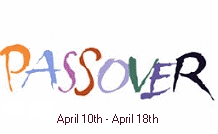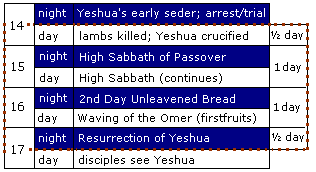|
Jewish Holiday Calendar
Note: For March 2017 site updates, please scroll past this entry....
Spring is the start of the Biblical Year and is marked by two of the Shelosh Regalim (three annual pilgrimage festivals): Pesach (Passover) and Shavuot (Pentecost). The holiday of Shavuot is held seven weeks (or fifty days) following the morning after Pesach.
The Spring Holidays:
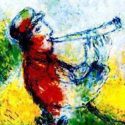
The spring holidays provide a portrait of the death, burial, and resurrection of the Messiah: Yeshua was crucified on erev Pesach, buried during Chag Hamotzi, and was resurrected on Yom Habikkurim (Firstfruits). Shavuot (i.e., the feast of Pentecost) was the day the Ruach HaKodesh (Holy Spirit) fell on believers in fulfillment of the promise given by our Lord.
Note that in accordance with tradition, the following holiday dates begin at sundown:
- Month of Adar (Sat., Feb. 25th [eve] - Mon., March 27th [day])
- Month of Nisan (Mon. March 27th [eve] - Tues. April 25th [day])
- Month of Iyyar (Tues. April 25th [eve] - Thurs. May 25th [day])
- Month of Sivan (Thurs. May 25th [eve] - Fri. June 23rd [day])
Note: The holiday of Passover -- and particularly the Festival of Firstfruits -- will not occur near the traditional date of "Easter" or "Resurrection Sunday" as it is often called in the Gregorian calendar... For more information, see the Calendar Pages....
Dates for Passover 2017:
Free Seder Guide
March 2017 Updates
Note: If any page content appears to be missing, please refresh the page...
The Struggle of Faith...

03.31.17 (Nisan 5, 5777) Regarding the question of faith, Soren Kierkegaard once wrote, "The easiness of Christianity is distinguished by one thing only: by the difficulty. Thus the Master's yoke it easy and its burden light -- for the person who has cast off all his burdens, all of them, the burdens of hope and of fear and of despondency and of despair -- yet it is difficult." Yes, the difficult thing is to truly believe (John 16:31). Sins can be like great possessions that are difficult to give up. Among other things, we must forgive ("give away") our sins (both our own and those against us), and that means trusting God enough to bear our wounds for us. Forgiveness allows us to move on with our lives by letting go of the pain of the past (2 Cor. 5:16). It is "easy" to understand this, but it is difficult to live it.
הַשְׁלֵךְ עַל־יְהוָה יְהָבְךָ
וְהוּא יְכַלְכְּלֶךָ
לא־יִתֵּן לְעוֹלָם מוֹט לַצַּדִּיק
hash·lekh · al · Adonai · ye·hav·kha
ve·hu · ye·khal·ke·le·kha
lo · yit·ten · le·o·lam · mot · la·tzad·dik

"Cast your burden on the LORD,
and He will sustain you;
He will never permit the righteous to be moved."
(Psalm 55:22)

Hebrew Study Card
The message of the cross is scandalous to human pride because it reveals that we are powerless to save ourselves. We trust Yeshua's finished work performed on our behalf, not our own works of righteousness (John 6:29). The Torah of Yeshua (תּוֹרַת יֵשׁוּעַ), however, does indeed include some very specific commandments, including the following:
- "Thou shalt believe thou are my beloved - entirely accepted and entirely forgiven"
- "Thou shalt forget the shame of thy past"
- "Thou shalt stop thinking of your sin but rather of My great remedy for you"
- "Thou shalt let me carry your woundedness far away, yea, to the bottom of the sea"
- "Thou shalt live in My love and be filled with its spirit"
- "Thou shalt believe in a happy ending, and that love is stronger than justice"
- "Thou shalt fear nothing but that which causes you to lose hope in My love..."
(Please note that these are implications derived from various Scriptures. For example, see Isa. 54:8; Jer. 31:3; Isa 54:4; Jer. 31:34; Heb. 8:12; Isa. 41:10; 45:22; Rom. 4:25; Psalm 103:10-14; John 14:1,27; Mic. 7:19; Isa. 38:17; John 14:21; 15:5,10; Gal. 5:22-23; 1 Cor. 13; 1 John 3:1; Rom. 8:28-39; Psalm 89:14; 85:10; Luke 11:42; 1 John 4:18, etc.)
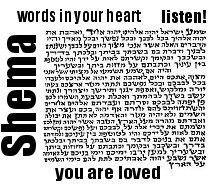 |
The difficulty, I repeat, is to genuinely believe that the love's miracle is for you - and that therefore you really are a "new creation" in the Messiah (2 Cor. 5:17). The reason this is difficult is because we are still living in an "already-not-yet" place of exile, the "two-souled" state of being that only is able to "see through a glass darkly." We are trusting in God, yet we must "work out" our own salvation with fear and trembling (Phil. 2:12). But notice that we "work out" what God has already "worked in," since it is "God who works in you both to will and to do His good pleasure" (Phil. 2:13). Please do not miss this - God first works His love into our hearts, and then we are able to express that in works of love... From start to finish, only genuine faith in Yeshua performs the "work of God" (John 6:28-29), and never our own ludicrous efforts of affecting self-righteousness (Titus 3:5). If you are lacking in the fruit of the Spirit (i.e., the works of God), then the right approach is to turn around and confess your faithlessness: "Lord, I believe; help Thou my unbelief..." (Mark 9:24). Our LORD is near to the brokenhearted and saves the crushed in spirit (Psalm 34:18).
May we all draw near to the LORD and call upon His Name for life this very hour, this very moment, and at this time... Amen.
 |
Gratitude and Spirituality....
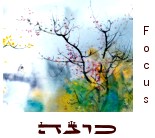
03.31.17 (Nisan 5, 5777) Expressing gratitude is a core value of genuine spirituality. "Modei ani," I thank you, God... Being thankful indicates that you are trusting that God is working all things together for your good, and it confesses that all you are is a gift from heaven. Indeed, the Hebrew word todah (תּוֹדָה), usually translated "thanks," can mean both "confession" and "praise." The matriarch Leah used a play on words regarding the birth of her fourth son (Gen. 29:35) when she said she would thank the LORD (אוֹדֶה אֶת־יהוה), and therefore she named him "Judah" (יְהוּדָה), from which the word "Jew" was later derived. The Apostle Paul, the greatest of the Torah sages, alluded to this when he said that a true Jew (יְהוּדִי) is one inwardly (κρυπτός), whose circumcision is a matter of spirit, not of the flesh. A genuine Jew gives thanks to God for who He is and what He has done; his desire is not for the approval of men, but of God (Rom. 2:28-29).
הוֹדוּ לַיהוָה כִּי־טוֹב
כִּי לְעוֹלָם חַסְדּוֹ
ho·du La·do·nai ki tov ki le·o·lam chas·do

"Give thanks to the LORD, for he is good,
for his loyal love endures forever."
(Psalm 136:1)

Hebrew Study Card
The patriarch Judah's name eventually designated the tribe and tribal district in which Jerusalem was located, and its inhabitants (regardless of their original tribal origin) were called "Judahites," "Judeans" (יְהוּדִים) or, in the shorter form, "Jews." In the Bible, the shorter term first appears after the destruction of the First Temple, 2 Kings 25:25, and was later used in the books of Jeremiah, Ezra/Nehemiah. The term also used in the New Testament to designate any physical descendent of Abraham, Isaac, and Jacob.
Note: Today is our beloved son Judah's eighth birthday! Please offer up a prayer for this boy to become a man of God who will serve the LORD our God. Thank you!
Drawing Near by Sacrifice....
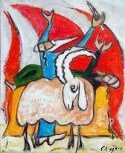
[ The following is related our Torah reading for this week, parashat Vayikra... ]
03.31.17 (Nisan 5, 5777) The classical sages say that the word vayikra (וַיִּקְרָא) expresses a sort of ambivalence about how we are able to connect with God. Rashi says the verb can be interpreted to derive from the root yakar (יָקָר), meaning "costly" or "dear," so we read: "And he was dear, and the LORD spoke to Moses." On the other hand, the verb may be related to the word mikreh (מִקרֶה), a chance meeting, so we read: "And he happened to encounter God, and the LORD spoke to Moses..." The very first word of the Book of Leviticus, then, raises questions about closeness and distance, of drawing near yet remaining outside. There is the call to draw near from above, yet it calls out to us in our separation...
Sin causes separation from God, and the way this separation is overcome is by means of sacrifice, or "korban," which may be defined as that which is given up to draw us near (קָרַב) to God. The quintessential archetype of sacrifice is given in the Akedah, where Abraham offered his beloved son on an altar, and where God provided a lamb to take his place. The Torah states that Abraham saw "another ram" (אַיִל אַחַר), which means he clearly regarded his son as a type of sacrificial lamb (Gen. 22:13). Isaac was made like a lamb yet afterward God provided a divine exchange. The offering up of what was most dear to Abraham drew him near to God, just as the offering up of what was most dear to God, namely, His only begotten Son, drew God to man... (more)
SHABBAT SHALOM AND SHANAH TOVAH CHAVERIM!
 |
A Blessed Brokenness...

03.30.17 (Nisan 4, 5777) Many of us have been given the special blessing of needing God so viscerally that we will fall apart or even self-destruct apart from His daily intervention in our lives... Yeshua speaks to the desperately needy of heart: "Blessed are the poor in spirit, for theirs is the kingdom of heaven" (Matt. 5:3). We groan in hope... In our Torah we read that the fire on the altar was to be kept burning at all times (Lev. 6:12-13), which symbolizes esh tamid (אֵשׁ תָּמִיד), or the inner fire of the heart... How blessed it is to be full of the fire of this inner need, this relentless groaning, this constant hunger to be set free. As it is written, the high and lifted up One dwells with the broken and lowly of spirit, to revive the spirit of the lowly and to revive the heart of the crushed:
כִּי כה אָמַר רָם וְנִשָּׂא שׁכֵן עַד וְקָדוֹשׁ שְׁמוֹ
מָרוֹם וְקָדוֹשׁ אֶשְׁכּוֹן וְאֶת־דַּכָּא וּשְׁפַל־רוּחַ
לְהַחֲיוֹת רוּחַ שְׁפָלִים וּלְהַחֲיוֹת לֵב נִדְכָּאִים
ki · kho · a·mar · ram · ve·nis·sa · sho·khen · ad · ve·ka·dosh · she·mo,
ma·rom · ve·ka·dosh · esh·kon · ve·et · dak·ka · ush·fal · ru·ach
le·ha·cha·yot · ru·ach · she·fa·lim · u·le·ha·cha·lot · lev · nid·ka·im

"For this is what the high and lifted up One says, the One who abides forever,
whose Name is Holy: "I dwell in a high and holy place, but also with the broken
and lowly of spirit, to revive the spirit of the lowly and to revive the heart of the crushed."
(Isa. 57:15)

Download Study Card
God reveals Himself to the "lowly in spirit" (שְׁפַל־רוּחַ), that is, to those who understand their own nothingness and complete dependence on Him.... Notice that the word dakka (דַּכָּא) refers to being crushed to the very dust, the very same word used to describe how Yeshua was crushed for our iniquities (Isa. 53:10). William James called this deep work of the spiritual life Zerrissenheit, a term that can be translated as "torn-to-pieces-hood," or a state of being utterly broken and in disarray (see William James: Varieties of Religious Experience). From the point of view of our dependence on God for salvation, dakka refers to humility and contrition we express in light of God's unmerited favor and love for our souls... We identify with the death of Messiah offered on our behalf; we find healing and acceptance in the Presence of the One who was torn to pieces and made dust for our merit. Humility is essential to awareness of God in the truth.
The Meaning of Holiness...
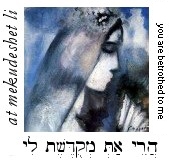
03.30.17 (Nisan 3, 5777) "For I am the LORD who brought you up out of the land of Egypt to be your God. You shall therefore be holy, for I am holy" (Lev. 11:45). Because we are God's people, his redeemed children, we should be holy, just as God is holy (1 Pet. 1:15-16). Holiness, however, is not a matter of what you do (such as wrapping yourself in religious rituals) but instead is a matter of what you "allow" to happen: You let go and allow yourself to be rescued and taken up from the "depths of Egypt" to be with God. Holiness is something you receive by faith; it is a gift of being "set apart" to be sacred and beloved by God. Genuine holiness (i.e., kedushah) is connected with love and grace...
In Hebrew, the word kedushah (קְדוּשָׁה) means sanctity or "set-apartness" (other Hebrew words that use this root include kadosh (holy), Kiddush (sanctifying the wine), Kaddish (sanctifying the Name), kiddushin (the ring ceremony at a marriage), and so on). Kadosh connotes the sphere of the sacred that is radically separate from all that is sinful and profane. As such, it is lofty and elevated (Isa. 57:15), beyond all comparison and utterly unique (Isa. 40:25), entirely righteous (Isa. 5:16), glorious and awesome (Psalm 99:3), full of light and power (Isa. 10:7), and is chosen and favored as God's own (Ezek. 22:26).
After the LORD split the sea and led his people across, Israel sang a song of praise to Him. Shirat Hayam (the Song of the Sea) is an "antiphon", or song of response to the loving deliverance given by the LORD (Exod. 15:1-21). "The LORD is my strength and my song, and he has become my salvation; this is my God, and I will praise him, my father's God, and I will exalt him..." "Who is like you, O LORD, among the gods? Who is like you, majestic in holiness, awesome in glorious deeds, doing wonders? You have led in your steadfast love the people whom you have redeemed; you have guided them by your strength to your holy abode... You will bring them in and plant them on your own mountain, the place, O LORD, which you have made for your abode, the sanctuary, O Lord, which your hands have established."
Note further that the opening statement, "Then they sang" is actually in the future tense: "Then they will sing," which refers to the coming of Messiah. Indeed, in Revelation 15:3 we read that the song will indeed be sung to the Heavenly Bridegroom in the coming New Jerusalem... Note also that in the closing phrase of the song, "the LORD will reign forever" (Exod. 15:18), the word "will reign" (יִמְלךְ) is spelled with a missing Vav, which suggests the Messiah Yeshua. The LORD will indeed reign when the rightful heir to the throne of David and the true King of Israel soon appears. Then shall we be with our Beloved forever and ever.
 |
Drawing Near to God...

[ The following is related our Torah reading for this week, parashat Vayikra... ]
03.30.17 (Nisan 3, 5777) Recall that the climax of the revelation given at Sinai was the commandment to construct the Sanctuary (מקְדָּשׁ), otherwise called the Mishkan (מִשְׁכָּן) or the "Tabernacle." In other words, the redemption secured by the blood of the lamb in Egypt led directly to the revelation of the laws of the altar revealed at Sinai. Nearly half of the Book of Exodus is focused on the Mishkan, and the book concludes with the Shekhinah Glory of God revealed at Sinai filling the Holy of Holies (Exod. 40:34-35).
The Book of Leviticus (וַיִּקְרָא) links the closing paragraph of the Book of Exodus with the religious practices within the Mishkan itself, and therefore it focuses on the various forms of offerings and sacrifices (i.e., zevachim: זְבָחִים) that were integral to the worship of God. As the climax of God's revelation at Sinai, the Mishkan became the place of God's revelation (Exod. 25:22; 30:36) and the locus of corporate worship. Prophetically, the Mishkan represented the redemptive plan of God for Israel that culminated in the revelation of Yeshua the Messiah as the appointed Lamb of God (i.e., seh ha-Elohim: שֵׂה הָאֱלהִים). The Book of Leviticus is therefore central to the Torah and provides the basis for understanding the multifaceted meaning of the sacrifice of Yeshua for our reconciliation with God. The great doctrines of the Atonement (καταλλαγή), propitiation for sin (i.e., ἱλαστήριος / כַּפָּרָה), and the meaning of the Cross of the Messiah as revealed in the New Testament are all grounded in the sacrificial system revealed in the Mishkan.
In modern English the word "sacrifice" usually means an act of self-deprivation, when we give up something of value for the sake of a greater value. In the Torah, however, the idea of sacrifice has more to do with making an offering to God as a means of drawing near to Him. Positively put, such sacrifices were intended to express gratitude and joy; negatively put, they were intended to remove obstacles caused by defilement and sin. Indeed, the most common Hebrew word used to describe sacrifice is korban (קָרְבָּן), which comes from the root karov (קָרַב) meaning to "draw close" or "to come near." In the Mishkan, korbanot (קָרְבָּנוֹת) were various ritual acts that were used for the worshipper to draw near to God.
It should be noted that most of the sacrifices were intended to be enjoyed as part of a communal meal or to provide sustenance for the priests. A portion of the animal was symbolically sacrificed to God, while the remainder was eaten by the sacrificer and his guests. In this way, a sense of communion between the people and God was realized. (During the Temple period, sacrifices were accompanied with music and singing). Only the olah (עלָה), or "whole burnt offering," was entirely consumed upon the altar. There are allusions that the sacrifices represented "food" for God (Lev. 1:9; Num. 28:2), though the Scriptures repeatedly warn against understanding this in anthropomorphic terms (e.g., Psalm 50:12-13), and the prophets later decried the idea that God desired sacrifices more than He demanded ethical behavior (Amos 5:22-25; Jer. 7:22-23; 1 Sam. 15:22-23; Hos. 6:6; Isa. 1:11-20; Micah 6:6-8). According to the prophets, there can be no legitimate substitution of ritual for personal moral responsibility, and their hyperbole was intended to "get the order right" in the matter of sacrifices. "To obey is better than sacrifices..." The point of the Torah sacrifices was to provide a sense genuine communion with God and others – and that implied a heartfelt commitment to justice and the ethical imperatives of the Torah. .
For more on this subject, see "Korban and Zevachim: Further thoughts on Vayikra."
 |
Waking up to Holiness...
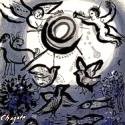
03.30.17 (Nisan 3, 5777) The Torah records God's first act of creation with the imperative utterance: "Let there be light" (i.e., yehi or: יְהִי אוֹר) and then goes on to say that "God separated (וַיַּבְדֵּל) the light from the darkness (Gen. 1:3-4). It is this "separation," or distinction, that is foundational to the concept of kedushah (קְדֻשָּׁה), or "holiness." Holiness is also expressed in the distinction between ordinary and sacred time: "God blessed the seventh day and made it holy" (יְקַדֵּשׁ) because on it God rested from all his work that he had done in creation" (Gen. 2:3).
The overall theme of the Book of Leviticus is kedushah, and indeed the Hebrew root (קדשׁ) occurs over 150 times in the book. Since God is kadosh (קדשׁ), we must be kadosh in our lives as well, and this means first of all being conscious of the distinction between the sacred and the profane, the "clean" and the unclean, and so on. "You are to distinguish between the holy and the common, and between the unclean and the clean" (Lev. 10:10). Note that the word translated "distinguish" (וּלֲהַבְדִּיל) comes from the same verb used to describe how God separated the light from the darkness. We are to separate between (בֵּין) the holy and the profane, which means we need understanding (i.e., binah: בִּינָה), or the ability to discern between realms of reality... As it is written, "You shall be holy to me, for I the LORD am holy and I have separated you (וָאַבְדִּל) from other people that you should be mine" (Lev. 20:26).
וִהְיִיתֶם לִי קְדשִׁים כִּי קָדוֹשׁ אֲנִי יְהוָה
וָאַבְדִּל אֶתְכֶם מִן־הָעַמִּים לִהְיוֹת לִי
vi·yi·tem · li · ke·do·shim · ki · ka·dosh · a·ni · Adonai
va·av·dil · et·khem · min-ha·a·mim · li·he·yot · li

"You shall be holy to me, for I the LORD am holy
and I have separated you from the peoples to be mine"
(Lev. 20:26)

There is no other way to approach the Holy One apart from consciousness of His infinite glory and unsurpassable worth. "I will lift up my eyes to the hills" (Psalm 121:1). As the Holy One (i.e., ha-kadosh: הַקָּדוֹשׁ), the LORD (יהוה) is utterly unique, distinct, sacred, and set apart as the only One of its kind. He alone is worthy of true worship and adoration, since He alone is utterly peerless, without rival, and stands in relation to the world as Creator, Redeemer, and Lord. To affirm the LORD is holy is to be conscious that He is utterly sacred.
Holiness involves first of all the awareness or consciousness that there is a realm of reality "higher than" the material world (the light God created and separated from darkness was not physical), and this realm of reality is centered on Person and Will of God. A denial of this leads to the idolatrous view that material (i.e., profane) reality is absolute and therefore ascribed eternal worth. "The fear of the LORD is the beginning of wisdom." However, the LORD does not want us to merely recognize His holiness (in some abstract or intellectual sense) but calls us to be in relationship with Him, and this implies personal sanctity and separation: Again, "you shall be holy to me, for I the LORD am holy and I have separated you (וָאַבְדִּל) from other people that you should be mine" (Lev. 20:26). The purpose of the sacrificial system was to draw near to God, and this "drawing near" required a separation from the profane world and its habitual uncleanness. The call to be holy is therefore the call to wake up and become alive to God's Presence in this world.
 |
Teshuvah and Despair...

03.29.17 (Nisan 2, 5777) There are moments – dark, gnawing, raw – when you may lose sight of hope, when you might even fear that you have lost your faith – not in God or his promises – but rather in yourself, in your own strength to continue, to stay focused, to keep pressing on "hope against hope..." The remedy here is always the same: to remember that within you – that is, in your flesh - "there is no good thing" and that the miracle of salvation is made secure by God's passion for you, not your own power or desire. "Not by might, nor by power, but by my Spirit, saith the LORD of Hosts." We don't trust in ourselves nor in the strength of our inner resolve, but solely in the power of God to make the way. We must turn away from ourselves to regain the message of God's unfailing love; only when we lose sight of ourselves do we find ourselves. God redeems you from your lost estate and touches you in your uncleanness; He clothes himself in your pain so that you may be clothed in his love. That never changes, despite dark moments, and to that we must always return...
Where it says, "I can do all things through Messiah who strengthens me" (Phil 4:13), that includes being healed of the inner pain of rejection, abandonment, and even abuse suffered from childhood. It means being set free from disillusionment, despair, and the oppression of relentless fear. "I can do all things through Messiah" means no longer accepting messages of self-hatred and hopelessness, no longer heeding the malicious whispers that say: "I am of no value," "I am unlovable," "my life is hopeless." No, "I can do all things through Messiah" means learning to be accepted, honored, and esteemed by God; it means opening your heart to God's love and blessing for your life; it means allowing your heart to be made right, to have inner peace... After all, Yeshua's great prayer was that we would know the truth of God's love for us (John 17), and this is the central need our lives...
 |
Blessing for Darkness...
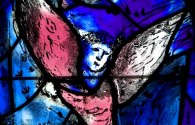
03.29.17 (Nisan 2, 5777) "If I say, surely darkness covers me, the darkness is not made dark to you, but the night shines as the day ... nothing hides from your radiance" (Psalm 139:11-12). Indeed, "no creature is hidden from his sight, but all are naked and exposed to the eyes of him to whom we must give account" (Heb. 4:13). We have to trust that God is present in the midst of our darkness, in the silence, in the unknown... You come out of the shadows when you admit that you act just like other people, that you are human, in need of reconciliation yourself... Above all you need God. You need help. You need a miracle to help you to truly love. You may find excuses for many things, but you cannot escape the "wretched man that I am" reality that is grounded in your fears. God sees in the darkness and is present there, too. When you feel alone, like an unbridgeable gulf lay between you and all that is good, even then may the LORD shine His light upon you...
גַּם־חשֶׁךְ לא־יַחְשִׁיךְ מִמֶּךָ
וְלַיְלָה כַּיּוֹם יָאִיר
כַּחֲשֵׁיכָה כָּאוֹרָה
gam · cho·shekh · lo · yach·shikh · mi·me·ka
ve·lai·lah · ka·yom · ya·ir
ka·cha·she·khah · ka·o·rah

"The darkness is not made dark to you;
but the night shines as the day:
as the darkness so is the light...
(Psalm 139:11)

"For it is you who light my lamp; the LORD my God outshines my darkness" (Psalm 18:28). There is "depression," and there is the dark night of the soul, and these are different matters, though they may overlap... "Hope deferred makes the heart sick." The dark night of the soul is an experience of trusting God in the darkness yet has a spiritual direction and end. We walk through this darkness with God and learn from him even there....
Humility and Torah...
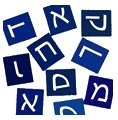
[ The following is related our Torah reading for this week, parashat Vayikra... ]
03.29.17 (Nisan 2, 5777) It is an age-old Jewish custom to begin teaching young children the Torah beginning with Vayikra because they, like the sacrifices themselves, are considered pure. The sage known as the Kli Yakar states that this is one of the reasons why the Aleph (א) in Vayikra (ויקרא) is written very small in the Torah scroll. Let these teachings be the beginning, like the letter Aleph, which is the beginning of the Aleph-Bet. When we humble ourselves as little children, God will reveal His truth to us, just as Messiah humbled himself for the sake of touching us in our frailties...
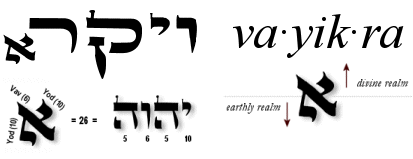 |
Aleph is the first letter of the first word of the first commandment of God: anokhi (אָנכִי): "I AM" (Exod. 20:2), which also designates the Name ehyeh (אֶהְיֶה) first revealed to Moses (Exod. 3:14). The numerical value of Aleph is one, indicating its preeminence, and it is a silent letter, alluding to the ineffable mystery of God's sovereign will (the related word aluph (אַלּוּף) means "Master" or "Champion"). In the Hebrew script used for writing Torah scrolls (ketav Ashurit), Aleph is constructed from two Yods (that represent "hands") joined by a diagonal Vav (that represents man). One Yod (י) reaches upward while the other reaches downward, and both extend from the "fallen" Vav (ו), picturing a "wounded Man" or Mediator (1 Tim. 2:5). In the Hebrew numbering system (i.e., gematria), Yod = 10 and Vav = 6, so adding up the three parts of Aleph yields 26, the same value as the Name of the LORD: YHVH (יהוה). The very first letter of the Hebrew Alphabet, then, pictures the three-in-one LORD who mediates all of life for our salvation. And just as there are three parts to Aleph, but Aleph is One (echad: אֶחָד), so there are three Persons to the Godhead, yet God is absolutely One. Indeed, the gematria of the word Aleph (אָלֶף) is 111 (Aleph=1, Lamed=30, and Pey=80). As Yeshua said, every "jot and tittle" of Scripture is significant...
 |
The Place of Atonement...
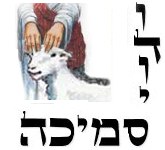
03.29.17 (Nisan 2, 5777) From our Torah portion this week (Vayikra) we read: "He shall bring it (i.e., the offering) to the entrance of the tent of meeting (אהֶל מוֹעֵד), that he may be accepted before the LORD. He shall lay his hand on its head and it shall be accepted for him to make atonement on his behalf (לְכַפֵּר עָלָיו). Then he shall slaughter it before the LORD, and Aaron's sons the priests shall bring the blood and throw the blood against the sides of the altar. Then he shall flay the offering and cut it into pieces..." (Lev. 1:3-6). We are justified by faith, but that means we bring our hope to the appointed place where God meets with us. We have "access by faith into this grace wherein we stand" (Rom. 5:2), and that implies we trust that God gives us right standing on account of his great love. We come to the cross - the entrance of the tent - and "lean into" our Lord, identifying with his death as atonement on our behalf. As it is written: "God has ordained a place of atonement (i.e., ἱλαστήριος, or "mercy seat" [i.e., kapporet: כַּפּרֶת]), in the cross of Yeshua, accessible through faith in his blood, for the demonstration of His righteousness, so that God might be both just and the justifier of the one who has faith in Yeshua" (Rom. 3:25-26).
It has been noted that there were no prescriptions of words to be spoken during the semikhah/shechitah ceremony (i.e., sacrificial ceremony), no formulas or ritualized prayers. The sacrifice was performed in silence. The worshipper would firmly lay both hands on the head of the sacrificial victim and reflect that this animal's fate should really be his -- i.e., that he deserved to die for his sin. Only because of the LORD's mercy was this animal accepted in his place, and therefore the sacrificial rite was ultimately one of healing and restoration... This is the "korban" principle of "life-for-life." When the LORD saw the shed blood and ascending smoke of the sacrifice, He forgave the sinner based on his faith and teshuvah (repentance). The "sweet savor" (i.e., re'ach nicho'ach: רֵיחַ־נִיחוֹחַ) of the sacrifice refers to the future life (and healing) of the worshipper -- not the sacrifice itself. By itself -- apart from genuine repentance -- the sacrifice holds no power to forgive sin, and indeed, forgiveness is a relational concept (Matt. 5:24, 6:12, Isa. 1:11, etc.). In the Levitical system, the offering of a sacrifice served as a "symbol and expression of man's desire to purify himself and become reconciled to God" (Nehama Leibowitz: New Studies in Vayikra).
"God put forward Yeshua as a propitiation (ἱλαστήριον) through faith in His blood" (Rom. 3:25). The sprinkling of Yeshua's blood - represented by His Passion upon the cross - was "presented" upon the Heavenly Kapporet, before the very Throne of God Himself. Yeshua here functions as the great High Priest after the order of Malki-Tzedek (i.e., Melchizedek) who provides everlasting forgiveness for our sins (Heb. 9:7-10:10). Because of His sacrifice, the parochet - the wall-like covering separating the Holy of Holies - was rent asunder and God's love was let loose upon the world! Baruch Hashem! All those who are trusting in Yeshua as their atoning sacrifice before God (i.e., kapparah: כַּפָּרָה) are able to draw near to God full of confidence in his love (Heb. 4:16; Rom. 5:2; Eph. 3:12).
 |
A New Beginning...

03.28.17 (Nisan 1, 5777) The very first word of the Torah indicates the significance of time, namely, bereshit (בְּרֵאשִׁית) - "in the beginning..." (Gen. 1:1), and according to tradition, the very first commandment given to the children of Israel (as a whole) was that of Rosh Chodesh (ראש חודש), or the declaration of the beginning (i.e., rosh) of the "new month," and particularly the very first month of their redemption (see Exod. 12:2). In other words, Passover month was to begin Israel's year, and indeed the sacrificial system itself (i.e., the Tabernacle) was consecrated precisely on the new moon of the first month (see Exod. 40:2). Note that the Hebrew word for month (i.e., chodesh) comes from the root chadash (חָדָש), meaning "new," and therefore the Passover redemption was intended to mark a "new beginning" for the Jewish people. And indeed, God marks the start of our personal redemption as the beginning of our life as a new creation (2 Cor. 5:17), just as Yeshua is the "first of the firstfruits" of God's redeemed humanity (1 Cor. 15:45-49).
 |
Leviticus and the Lamb...

[ Today is Rosh Chodashim, Biblical New Year's Day... Shanah tovah u'metukah, friends! ]
03.28.17 (Nisan 1, 5777) The Book of Leviticus (ספר ויקרא) is the third of the Torah, representing another stage in our spiritual journey. Genesis reveals both our divine origin but also our tragic fallenness, and the book ends with our need for deliverance from bondage to Egypt. Exodus reveals that we are liberated from slavery by trusting in the provision of God demonstrated by the sacrifice of the Passover lamb, and the book ends with the climax of the revelation of Torah given at Sinai, namely, the building of the Mishkan (Tabernacle) where the the need for blood atonement was enshrined. Indeed blood atonement is the central theme of the central book of Torah, i.e., Leviticus, where we are called to draw near to God through sacrificial rites, the foremost of which was the ongoing offering (i.e., korban tamid: קָרְבַּן תָּמִיד) of a defect-free male lamb, together with unleavened bread and wine. The LORD called this "My offering, My bread" (Num. 28:1-8). In other words, the center of the Torah is the altar that constantly prefigured the Lamb of God who would be offered up to secure our eternal redemption (John 1:29; Heb. 9:11-12).
רָאוּי הַשֶּׂה הַטָּבוּחַ לְקַבֵּל גְבוּרָה
עשֶׁר וְחָכְמָה וְכּחַ וִיקַר וְכָבוֹד וּבְרָכָה
ra·uy · ha·seh · ha·ta·vu·ach · le·ka·bel · ge·vu·rah
o·sher · ve·chokh·mah · ve·ko·ach · vi·kar · ve·kha·vod · uv·ra·kha

"Worthy is the Lamb who was slain, to receive power and wealth and wisdom
and might and honor and glory and blessing"
(Rev. 5:12)

Download Reading Card
Though God instructed each household to select its own defect-free lamb for the family Passover, the Torah refers to "the" Lamb of God, as if there was only one: "You shall keep it [i.e., the Passover lamb] until the fourteenth day of this month, when the whole assembly of the congregation of Israel shall slaughter him (אתוֹ) at twilight (Exod. 12:6). Indeed there is only one great Lamb of God "slain from the foundation of the world," namely, the One given in the Garden of Eden (Gen. 3:21), sacrificed in place of Isaac during the Akedah, selected for the Passover from Egypt (and later commemorated as korban tamid (the daily offering) at the Temple (Num. 28:1-8)), later incarnated as our Savior, the great Lamb of God who offered Himself upon the cross for our sins (John 1:29), and who ascended to eternal victory to be seated upon the very Throne of God's Glory (Rev. 5:12-13; Rev. 22:1). Amen, the Torah centers on the great Lamb of God....
Sacrifice and Blessing...
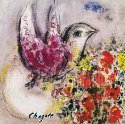
[ This is related to our Torah for this week, parashat Vayikra. Shanah tovah, friends... ]
03.28.17 (Nisan 1, 5777) From our Torah reading this week (Vayikra) we read: "When any person of you (mikem) brings an offering to God..." (Lev. 1:2), upon which the midrash comments: "Why does the text state 'mikem," translated "of you"? Because from this we derive that whoever recites one hundred blessings a day is as if he or she offered sacrifice. And how do we know this? From the Hebrew word mikem (מִכֶּם), which has a numerical value of 100: Mem + Kaf + Mem" (Yalkut Ma'ayan Ganim). The midrash attempts to connect the practice of "making a blessing" over the various moments of our day (arising, bathing, eating, drinking, etc.) with that of sacrifice, suggesting that the essence of sacrifice is gratitude...
Some of the early sages likened "making a blessing" to requesting God for permission to partake of the goodness of His world. Offering thanks "opens the world" to the Divine Presence, which in effect, sanctifies our experience. When we slow down and savor the moments of life, we will become more aware, more sensitive, and more receptive to the miracle of what is given... "The "sacrifice of praise" will flow from us spontaneously as we contemplate the peaceful glory of a sunset, listen to the song of a bird, smell the scent of a strawberry, or sit around the table with family or friends. In this way we become a "living sacrifice" as we walk in gratitude and love (Eph. 5:2; Heb. 13:15).
The Scriptures counsel us to be transformed by "renewing our minds" (Rom. 12:2), though how we are to do this remains an open question. Our perspectives and attitudes are shaped by our assumptions about life, many of which are "pre-conscious" or hidden from our awareness. Habitual thoughts, biases, prejudices, fears, etc., all affect (and distort) the way we see and understand reality. In light of this, how can we change? How can we overcome our habitual negativity, misery, and general unhappiness? How do we develop right thinking power? How do we learn to apply our minds to perceive the good, instead of responding in unreflective and negative ways to our circumstances? How do we discipline our will so that "if there is anything worthy of praise, think about these things" (Phil. 4:8)?
There are innumerable books on the subject of logic, detecting fallacies, and using sound reasoning techniques, but there are not many that discuss the "morality" of our thinking, that is, our God-given responsibility to perceive the truth and to consistently express it in our everyday actions. Since our thinking invariably leads to practical choices, we have a primary duty to know the truth and live out its implications in our lives. The failure to do so is not only inconsistent, logically speaking, but immoral, ethically speaking (and dangerous, spiritually speaking, since bondage is ignorance of the truth). If the truth bears witness that there is a personal God who creates each soul in the world, for instance, this should affect how we value and respect others, and the failure to do so will result in cognitive dissonance and internal contradiction that yields mental suffering, misery, emotional pain, and insecurity in our lives. A "double-minded" person is "two-souled" (δίψυχος), unstable (i.e., ungrounded, restless, unbalanced) in all his ways (James 1:8).
Healing comes from receiving the light of truth, being "single-minded," with our eye focused on what is real. "If your eye is "single" (i.e., ἁπλοῦς, sincere, focused)," Yeshua said, "your whole body will be filled with light" (Matt. 6:22). Likewise the Torah commands: "You shall be made whole (i.e., tamin: תָּמִים) with the LORD your God" (Deut. 18:13). We are made "whole" or "perfect" (i.e., complete) when we resolutely turn to God for healing of our inner dividedness, as it says: "The Torah of the LORD is perfect (תָּמִים), returning the soul" (Psalm 19:8). And where it is written, "Let us hear end of the matter: Fear God and love his commandments, the text adds: ki zeh kol-ha'adam (כִּי־זֶה כָּל־הָאָדָם), "for this is the whole man," suggesting that those who return will be healed of their double-mindedness (Eccl. 12:13). Ultimately we are made whole when we are united to God in Messiah, for then we are "with the LORD our God" and the Spirit writes Torah within the heart of faith (Jer. 31:33).
The heart of truth sees beyond the present to find meaning in the Eternal, yet it refocuses on the present to endow it with sacred significance... "Love hopes all things" (1 Cor. 13:7). To rightly see the present moment, in other words, we must first look to the Eternal, since that grounds our perspective and contextualizes our hope: "For this light momentary affliction is preparing for us an eternal weight of glory beyond all comparison, as we look not to the things that are seen but to the things that are unseen. For the things that are seen are transient, but the things that are unseen are eternal" (2 Cor. 4:17-18).
Regard this as a prophecy for your life: "You shall be made whole with the LORD your God." God's love heals the inner brokenness of our hearts. When we accept this, we discover that surrendering to God's will truly makes us "whole." "As many as I love, I reprove and correct: be zealous therefore, and turn. Listen! I stand at the door and knock. If anyone hears my voice and opens the door I will come into his heart and share a meal with him, and he with me" (Rev. 3:19-20). These are words of our Lord Yeshua, who speaks to those who "hear his voice." May you open the door of your heart; may you return to Him now...
Note: The phrase "sacrifice of praise" (θυσίαν αἰνέσεως) comes from the New Covenant Scriptures (i.e., Heb. 13:15), which is the term used in the ancient Greek translation of the Torah (i.e., the Septuagint) for the "thank offering" (i.e., zevach ha'todah: זבַח הַתּוֹדָה) that expressed gratitude to God for His salvation (θυσίας τοῦ σωτηρίου).
 |
Leviticus and Yeshua...

[ The following is related our Torah reading for this week, parashat Vayikra... ]
03.28.17 (Nisan 1, 5777) The Book of Leviticus (ויקרא) is to the Torah what the Book of Hebrews is to the New Testament. Leviticus is both the physical and spiritual center of the Five Books of Moses and comprises its ritual expression. The sages count 246 of the 613 commandments of the Torah in this book (over 40%), and many of the Talmud's discussions regarding ritual purity and holiness are based on it.
Many Christian readers of the Bible want to skip the Book of Leviticus, however, because they find the detailed description of the Mishkan (Tabernacle) and the various laws of the sacrificial system to be tedious and/or irrelevant for followers of Yeshua. This is unfortunate because in its pages the great sacrificial work of Yeshua is foreshadowed and explained for us. Indeed, without the underlying concepts "seeded" there, various fundamental New Testament teachings concerning the atoning sacrifice of Yeshua for our sins, justification by faith, and our duty to walk in sanctification would not make much sense....
The LORD intended that the sacrificial laws given to the Levitical priests (i.e., kohanim) would foreshadow the coming atoning sacrifice offered by Yeshua, the "Lamb of God slain from the foundation (יְסוֹד) of the world" (1 Pet. 1:19-20, Rev. 13:8). This is why these laws are called torat Kohanim - the "teaching of the priests." This instruction (i.e., torah: תּוֹרָה) was intended for all Israel to understand the need for blood atonement in order to draw near to God (Lev. 17:11). The Levitical system as a whole served as a "type" or "picture" of heavenly realities. Moses received the "pattern" (i.e., tavnit: תַּבְנִית) of the Throne of God on Sinai, but this was a physical copy or "shadow" of the spiritual Reality he beheld in visions. The Mishkan was always intended to be moved into the Promised Land, which King David later established in Zion, the place of the Holy Temple. But it was the sacrificial death of Yeshua that is the focal point and goal of it all: Yeshua is the Substance of all that the sacrifices foreshadowed...
For more on this topic please see "Leviticus and Yeshua."
 |
Rosh Chodashim...

03.27.17 (Adar 29, 5777) Tonight at sundown marks the beginning of the "New Year" as designated by the Scriptures, called Rosh Chodashim. The Torah plainly states: "This month is for you the head of the months" (הַחדֶשׁ הַזֶּה לָכֶם ראשׁ חֳדָשִׁים), and "it is the first to you of all the months of the year" (רִאשׁוֹן הוּא לָכֶם לְחָדְשֵׁי הַשָּׁנָה) [see Exod. 12:2]. Yes, we observe Rosh Hashanah (better, Yom Teruah) in the fall, though that is connected with the end of the harvest and prophetically looks forward to the "End of Days." This month, called the month of Nisan (also called Aviv), begins with the sighting of the new moon (not the sighting of barley as claimed by some) as was taught to Moses in preparation for the great Passover and deliverance from Egypt (see Exod. 12). Indeed the month of Nisan, the First Month, is rightly called "Chodesh Yeshuah" (חדֶשׁ הַיְשׁוּעָה), "the Month of Salvation," because it centers on the redemption given in Yeshua, the true Lamb of God....
The following prayer is customarily said during Rosh Hashanah, but it is equally applicable for the New Year of Nisan and the Season of Passover:
יְהִי רָצוֹן מִלְּפָנֶיךָ יהוה אֱלהֵינוּ
וֵאלהֵי אֲבוֹתֵינוּ
שֶׁתְּחַדֵּשׁ עָלֵינוּ שָׁנָה טוֹבָה וּמְתוּקָה
בַּאֲדנֵינוּ יֵשׁוּעַ הַמָּשִׁיחַ אמן
ye·hi · ra·tzon · mil·fa·ne·kha, · Adonai · E·lo·hei·nu
ve·lo·hei · a·vo·tei·nu,
she·te·cha·desh · a·lei·nu · sha·nah · to·vah · u·me·tu·kah
ba·A·do·nei·nu · Ye·shu·a · ha·Ma·shi·ach [a·men]

"May it be your will, LORD our God
and God of our fathers,
that you renew for us a good and sweet year
in our Lord Yeshua the Messiah." [Amen]
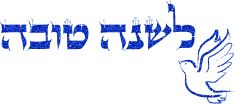
The Call of Vayikra...
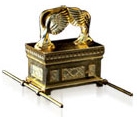
[ The following is related our Torah reading for this week, parashat Vayikra... ]
03.27.17 (Adar 29, 5777) The first verse of the Book of Leviticus is usually translated: "And the LORD called to Moses and spoke to him," where the subject of the verb vayikra (וַיִּקְרָא), "and he called," has an implied antecedent, which if expressed would read: "And the LORD called to Moses and the LORD spoke..." The Hebrew text of the Torah scroll is written with a small Aleph (א) at the end of the verb vayikra, however, indicating something of textual and grammatical interest. Note that the Hebrew letter Aleph is constructed from two Yods (each that represent a yad, or "hand") joined by a diagonal Vav (that represents a man). One Yod (י) reaches upward while the other reaches downward, and both extend from the "fallen" Vav (ו), picturing Yeshua, the humble One who was "wounded for our transgressions, and bruised for our iniquities" as our Mediator between heaven and earth (Isa. 53:5; 1 Tim. 2:5). The implied Subject, then, of vayikra can be seen to be the "small Aleph," the Humble One who calls out from the Tent of Meeting...
"And he called" is written anonymously, but once you understand that this is the Word of the LORD speaking, you will turn back to the Creator and then YHVH will speak to you from within the Tent of Meeting... May you hear His Voice now.
 |
Happy New Year!
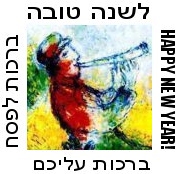
[ The central holiday of Passover begins Monday, April 10th at sundown this year... ]
03.27.17 (Adar 29, 5777) Did you know that the Biblical Year begins this coming Monday, March 27th at sundown (i.e., Nisan 1, 5777)? Indeed, the LORD explicitly set apart this day as the beginning of the months of the calendar (called Rosh Chodashim), the start of the calendar year itself (Exod. 12:1-2). But what about Rosh Hashanah in the fall? Isn't that the Jewish "new year"? Yes, Rosh Hashanah (or Yom Teruah) signifies a "new year" after the ingathering of crops at the end of the season (see Exod. 23:16). In light of this, we infer that there are two distinct "New Years" revealed in the Torah: the first occurs two weeks before Passover (i.e., Nisan 1) and the second occurs ten days before Yom Kippur, during Rosh Hashanah (i.e., Tishri 1). The first New Year marks the month of the redemption from Egypt by the blood of the lamb (חדֶשׁ הַיְשׁוּעָה), and it also marks the month in which Yeshua was sacrificed upon the cross at Moriah to redeem us from our sins (i.e., chodesh HaYeshuah). The second New Year marks the month of Israel's corporate salvation that will be fulfilled in the End of Days. We see that there is a symmetry in the divine calendar: the fall festivals "mirror" the spring festivals and correspond to one another. Just as there is a "new year" in the spring, on the new moon of Nisan, so there is in the fall, on the new moon of Tishri, the seventh month, and that is why we make a "teruah" shout of thanks to God in anticipation of the fulfillment of God's redemptive purposes during the End of Days.

The Rosh Chodesh Blessing...
The new moon of Nisan is the most significant of the "new moons" of the Jewish calendar since it initiates the first month of the Biblical Calendar. Of all the various Rosh Chodesh celebrations, then, Rosh Chodesh Nisan is foundational, since it presents the starting point for the cycle of the yearly festivals (mo'edim) that reveal prophetic truths about the LORD God of Israel and His beloved Son, Yeshua the Mashiach, blessed be He. Here is a simplified blessing you can recite to mark this special time:
יְהִי רָצוֹן מִלְּפָנֵיךָ יהוה אֱלהֵינוּ וֵאלהֵי אֲבוֹתֵינוּ
שֶׁתְּחַדֵּשׁ עָלֵינוּ חדֶשׁ טוֹב בַּאֲדנֵינוּ יֵשׁוּעַ הַמָּשִׁיחַ אָמֵן
ye·hi · ra·tzon · mil·fa·ne·kha · Adonai · E·lo·hei·nu · ve·lo·hei · a·vo·tei·nu
she·te·cha·desh · a·lei·nu · cho·desh · tov · ba'a·do·nei·nu · Ye·shu·a · ha·ma·shi·ach · A·men

"May it be Your will, LORD our God and God of our fathers,
that you renew for us a good month in our Lord Yeshua the Messiah. Amen."

Download Study Card
Note: The early Jewish sages also added two other new years on the calendar: Tu B'Shevat and Rosh Chodesh Elul... The Gentile world also has many different new year days, too, the most common of which being "January 1st," which marks the "new year" for the modern secular world... For more on this see "The Gregorian Calendar and Pagan Assumptions."
The LORD Calls Out - ויקרא

[ This week we begin a new book of Torah, sefer Vayikra (i.e., the book of Leviticus)... ]
03.26.17 (Adar 28, 5777) Our Torah portion for this week is Vayikra ("and he called"), the very first section from the Book of Leviticus. In Jewish tradition, Leviticus is sometimes called the "Book of Sacrifices" since it deals largely with the various sacrificial offerings brought to the altar at the Tabernacle. Indeed, over 40 percent of all the Torah's commandments are found in this central book of the Scriptures, highlighting that blood atonement is essential to the Torah. After all, since the revelation of the Tabernacle was the climax of the revelation given at Sinai, the Book of Leviticus serves as its ritual expression, as it is written: "For the life of the flesh is in the blood, and I have given it for you on the altar to make atonement for your souls, for it is the blood that makes atonement (kapparah) by the life" (Lev. 17:11).
Unlike narrative portions of other books of the Torah, the Book of Leviticus begins with the LORD "calling out" (i.e., vayikra: ויקרא) to Moses to explain that the way to draw near to Him is by means of atoning sacrifice. It is noteworthy that throughout the book, only the sacred name of the LORD (יהוה) is used in connection with sacrificial offerings, and never the name Elohim (אֱלהִים). This suggests that sacrificial offerings were given to draw us near to experience God's mercy and compassion rather than to simply appease His anger.... In other words, the Name of the LORD represents salvation (i.e., yeshuah: יְשׁוּעָה) and healing for the sinner, not God's judgment (John 3:17). Indeed, the word korban (קָרְבָּן), often translated as "sacrifice" or "offering," comes from a root word karov (קָרַב) that means to "draw close" or "to come near" (James 4:8). The sinner who approached the LORD trusting in the efficacy of the sacrificial blood shed on his or her behalf would find healing and life...
Note further that the word in the ancient Greek translation of the Torah (called the Septuagint) selected to translate the Hebrew word kapporet (i.e., "mercy seat") is hilasterion (ἱλαστήριον), sometimes translated "propitiation." The New Testament picks up this usage in Romans 3:25: "God put forward Yeshua as a propitiation (ἱλαστήριον) through faith in His blood." In other words, the shedding of Yeshua's blood - represented by His Passion upon the cross - was "presented" upon the Heavenly Kapporet, before the very Throne of God Himself for our atoning sacrifice (i.e., kapparah: כַּפָּרָה) before God.
Please see the summary for parashat Vayikra for more information. You can also download the Shabbat Table Talk for this portion here:
Endurance and Hope...
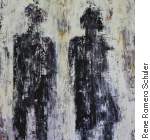
03.24.17 (Adar 26, 5777) Though we are optimistic about the purpose and end of reality, and though we believe that God "works all things together for good" (Rom. 8:28), we are not therefore monistic idealists, that is, those who say that evil is not real or who claim that it is "part of God." We are given "exceedingly great and precious promises," yet in this world we suffer and experience pain, heartache, and troubles. Yeshua said "in this world you will have tribulation," though that is not the end of the story, of course, for there is the cheer of God's' victory, even if we must repeatedly ask God for grace to endure our troubles without murmuring (John 16:33; Heb. 4:16). I realize that is often difficult, and some of you might be within the fiery furnace even now. You might be asking, "Where are you, Lord, in all of this? Why don't you bring me out of these troubles?" In such testing you need endurance (ὑπομονή) to hold on to hope, remembering that God uses affliction to refine you for good. As Paul said, "We rejoice in our sufferings, knowing that suffering produces endurance, and endurance produces refined character, and refined character produces hope" (Rom. 5:3-4). Each of us is still upon the "Potter's wheel," and God's hand continues to shape us into vessels that one day will reveal his glory and honor. "May the LORD give strength to his people! May the LORD bless his people with peace" (Psalm 29:11).
יְהוָה עז לְעַמּוֹ יִתֵּן
יְהוָה יְבָרֵךְ אֶת־עַמּוֹ בַשָּׁלוֹם
Adonai · oz · le·am·mo · yit·ten
Adonai · ye·va·rekh · et · am·mo · va·sha·lom

"The LORD will give strength to his people;
The LORD will bless his people with peace."
(Psalm 29:11)

Hebrew Study Card
Torah of the New...

03.24.17 (Adar 26, 5777) The moral law serves as a "mirror" that reveals our great need, but the Light of the mirror - the radiance that illuminates redemptive reality itself - is the great remedy we have in the Messiah. We are not saved by keeping the law but by trusting that God justifies the ungodly (Rom. 4:5). And just as we are saved by trusting in the power and righteousness of God (δικαιοσύνη θεοῦ), so are we sanctified. We don't come to the cross and then go back to the former covenant of law (which is likened to adultery, see Rom. 7:1-4). No, we are "married to another," given access to an entirely new order of reality, made into a new creation with a profoundly new, supernatural identity. Teshuvah, or "repentance," is returning to God by means of God's grace. Those who so turn, those who truly believe the message of the gospel, have been crucified with Messiah, are raised to newness of life, and have a "place at the table" in the kingdom. True life is found in relationship with the Eternal, and just as Messiah's death was given for our behalf, so also was his life (John 14:6; Rom. 5:10). All the imperatives of the New Testament are directed to the new nature within you, not to the old nature that seeks to justify itself through moral reform or the practice of religion. "We do not nullify the grace of God, for if righteousness were through the law, then Messiah died for no purpose" (Gal. 2:21). If the Spirit truly quickens, the soul already has become a recipient of the miracle.
Shabbat shalom and thank you for your prayers that this ministry may continue...
 |
Seeking the Good...

03.24.17 (Adar 26, 5777) It is written, "Whoever diligently seeks good seeks favor, but evil comes to him who searches for it" (Prov. 11:27). The one who seeks good is called shocher tov (שׁחֵר טוֹב), "a seeker of good." The shocher tov uses the "good eye" (ayin ha'tovah) to see worth and potential in others. The one who searches out evil, on the other hand, is called doresh ra'ah, "a searcher of evil." The doresh ra'ah has an evil eye (ayin ha'ra) that is stingy, critical and faultfinding. The proverb may therefore be stated this way: When you seek the good of others, you will find God's favor (ratzon), but when you search for evil in others, it becomes your own. As the Baal Shem Tov once said, "When we see faults in others, we must understand that they only reflect the evil within ourselves." Likewise King David said, וּתְפִלָּתִי עַל־חֵיקִי תָשׁוּב, "my prayer shall turn back upon my breast" (Psalm 35:13). Some prayers are conscious words spoken to God, whereas others are expressions of heart attitudes. Our proverb teaches that when we harbor indifference, ill will, or resentment toward others, we hurt ourselves; when we favor others and desire their blessing, on the other hand, we will find God's favor and blessing. Tov ayin hu yevorakh: "The one with the good eye will be blessed" (Prov. 22:9; Matt. 6:22).
שׁחֵר טוֹב יְבַקֵּשׁ רָצוֹן
וְדרֵשׁ רָעָה תְבוֹאֶנּוּ
sho·cher · tov · ye·va·kesh · ra·tzon
ve·do·resh · ra·ah · te·vo·ei·nu

"Whoever diligently seeks good seeks favor,
but evil comes to him who searches for it."
(Prov. 11:27)

Hebrew Study Card
Shabbat Shalom, and may it please God to help us seek favor and good in all our circumstances... "Finally, brothers and sisters, whatever is true, whatever is worthy of respect, whatever is just, whatever is pure, whatever is lovely, whatever is commendable, if something is excellent or praiseworthy, think about these things" (Phil. 4:8).
Future and Hope...

[ God is with you, even in moments of darkness, and He will help you reach the goal... ]
03.24.17 (Adar 26, 5777) Never yield to utter despair, since that leads to further darkness and fear. Press on and keep fighting the "good fight" of faith (1 Tim. 6:12). Remember that you infinitely matter to heaven; your life has great value; you are significant and you are truly loved by our Heavenly Father... Yes, there is a "future and a hope" reserved for you (Jer. 29:11); there is "a white stone, and on that stone will be written a new name that no one can understand except the one who receives it" (Rev. 2:17). This promise is given to the "one who conquers" (Τῷ νικῶντι) by means of the love and grace of our God. Indeed, by faith we are made "more than conquerors" (lit. "hyper conquerors," ὑπερνικῶμεν) through the Messiah and his love for us (Rom. 8:37). So do not lose heart; help is on the way!
כִּי אָנכִי יָדַעְתִּי אֶת־הַמַּחֲשָׁבת
אֲשֶׁר אָנכִי חשֵׁב עֲלֵיכֶם נְאֻם־יְהוָה
מַחְשְׁבוֹת שָׁלוֹם וְלא לְרָעָה
לָתֵת לָכֶם אַחֲרִית וְתִקְוָה
kee · a·no·khee · ya·da'·tee · et – ha·mach·sha·voht
a·sher · a·no·khee · cho·sheiv · a·ley·khem · ne·oom – Adonai
mach·she·voht · sha·lom · ve·lo · le·ra·ah
la·teit · la·khem · a·cha·reet · ve·teek·vah

"For I know the plans that I have for you, declares the LORD,
plans for blessing and not for evil, to give you a future and a hope."
(Jer. 29:11)

Hebrew Study Card
"I am sure of this, that he who began a good work in you will bring it to completion (ἐπιτελέω) at the Day of Yeshua the Messiah" (Phil 1:6). The LORD is able to guard you (φυλάξαι) from stumbling and to present you blameless before the presence of His glory with great joy (Jude 1:24). "The LORD upholds all who are falling and raises up all who are bowed down" (Psalm 145:14). "He will sustain you to the end, guiltless in the Day of our Yeshua the Messiah" (1 Cor. 1:8). He who calls you is forever faithful; He will surely do it (1 Thess. 5:24). Yea, "the Lord is faithful (נֶאֱמָן הוּא): He will establish you and guard you against the evil one" (2 Thess. 3:3). The Spirit says, "Fear not, for I AM with you always."
Made Right With God...
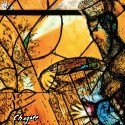
[ Mah-yitzdak enosh im-El? "How can a man be made right with God?" - Job 9:2 ]
03.24.17 (Adar 26, 5777) We are "justified" by trusting in the sufficiency of Messiah's work done for us, and not our own "good deeds" (Titus 3:5; 2 Tim. 1:9; Eph. 2:8-9). We need the power of God to save us from the hell of ourselves and from slavery to our sinful nature. True freedom comes by Messiah's achievement, not our own. The blessing of being rightly related to God is given to the person who abandons his own way and trusts in the One who "justifies the ungodly" (Rom. 4:5). This is called the "righteousness of God" manifested "outside the Law" (χωρὶς νόμου), though the Law and the Prophets bear witness to its reality (Rom. 3:21). There are two aspects to your deliverance by God's grace (Rom. 3:24). First, you trust that the death of Messiah entirely deals with your sin -- you identify with Yeshua as your sin bearer at the cross -- and you accept God's verdict that you are "not guilty." You are "justified" by faith (i.e., "just-if-I'd" never sinned; "just-if-I'd" always obeyed). Sin is taken out of the way, and you "die to the law" so that you may be in new covenant (relationship) with God (Gal. 2:19; Rom. 7:4), Second, you learn to live in the power of Yeshua's resurrection life; you learn to "be who you are" in Messiah: "Christ in you, the hope of glory" (Col. 1:27). The Torah of the Spirit of life (תּוֹרַת רוּחַ הַחַיִּים) imparts power for you to bear fruit for God (Rom. 8:2). Salvation means not only freedom from the guilt of your sin, but freedom from sin's power over you: "For one who has died has been set free from sin" (Rom. 6:7). You are forgiven by trusting in Messiah's death in your place, and you are made holy by trusting in his victorious life, but the miracle is made real by the agency of God's power, not your own. Salvation is of the Lord!
Note: This entry is consistent with the one below ("Moving Heaven's Heart"), since we rely entirely on God to do the work of transformation within us, yet we turn to God with all our heart, strength, and soul. We work out our own salvation with fear and trembling, because it is God within us that enables us to will and to do his will (see Phil. 2:12-13). "Follow peace (רִדְפוּ אֶת־הַשָּׁלוֹם) with all and experience the sacred..." (Heb. 12:14). No one can pursue a "costly obedience" since that is Messiah's work alone (Isa. 26:12). Bonhoeffer's theology of "costly grace" grew out of the "social gospel" in Germany more than balanced exegesis.
 |
Moving Heaven's Heart...

03.24.17 (Adar 26, 5777) Act as if your choices have eternal significance; they do; pray as if your life depends on it; it does. Praying in accordance with the will of God - to know Him, to walk in the light of his love and to be filled with wisdom, patience, kindness, and so on, will assuredly move heaven and earth (1 John 5:14). God is faithful and always hears those who call out to him with sincerity of heart: "The LORD is near to all who call on him, to all who call on him in the language of truth" (Psalm 145:18). Rouse then your heart! Boldly draw near to the throne of Grace to find help in your present hour of need (Heb. 4:16). Cry out to God Most High (לֵאלהִים עֶלְיוֹן), to the very One who will fulfill his purpose for you:
אֶקְרָא לֵאלהִים עֶלְיוֹן לָאֵל גּמֵר עָלָי
יִשְׁלַח מִשָּׁמַיִם וְיוֹשִׁיעֵנִי חֵרֵף שׁאֲפִי סֶלָה
ek·ra · le·lo·him · el·yon · la'el · go·mer · a·lai
yish·lach · mi·sha·ma·yim · ve·yo·shi·ei·ni · che·ref · sho·a·fi · se·lah

"I cry to God Most High, to God who fulfills his purpose for me.
He will send from heaven and save me from the reproach of those who pursue me"
(Psalm 57:1-2)

Our Heavenly Hope...

03.24.17 (Adar 26, 5777) Although we cannot imagine the great delights that await us in heaven (1 Cor. 2:9), what is most wonderful of all will be the end of all our loneliness and fear... Life in this world is radically contingent and subject to dissolution: everything crumbles and fades away: "for the wind passes over it, and it is gone; and the place thereof shall know it no more" (Psalm 103:16). Heaven represents the place of unconditional love and undying acceptance, the eternal answer to our anxious question of whether we truly belong. Heaven is the "end of the story," our true home, the place of eternal love, light, and grace. One day, friends, and we shall all dance in great joy together, in the Presence of the Beloved!
Near the Brokenhearted...

03.23.17 (Adar 25, 5777) Of the Messiah it is written, "A bruised reed shall he not break, and the smoking flax shall he not quench" (Isa. 42:3)... People conscious of their feebleness and who have been crushed because of it are likened to "bruised reeds," and he [the Messiah, the Savior] shall bring no injury to them... As it is written, "The LORD is near to the brokenhearted (נִשְׁבְּרֵי־לֵב) and saves the crushed in spirit." Indeed, the LORD binds up the broken of heart and gives liberty to those in captivity (Isa. 61:1). "A smoking flax shall he not quench" -- neither will the LORD snuff out an unsteady flame ready to expire, but will tend to it with special oil to cause it to burn more brightly.
קָרוֹב יְהוָה לְנִשְׁבְּרֵי־לֵב
וְאֶת־דַּכְּאֵי־רוּחַ יוֹשִׁיעַ
ka·rov · Adonai · le·nish·be·rei · lev
ve·et · dak·ei · ru·ach · yo·shi·a

"The LORD is near to the brokenhearted
and saves the crushed in spirit"
(Psalm 34:18)

Hebrew Study Card
Spirituality often enough involves a sense of irremediable brokenness, a feeling that you are not whole, that you are a mess, and that your need for God's healing is constant and relentless... Contrary to the ideals of proud humanism, spirituality is a state of "blessed neediness," of being "poor in spirit," that aches with inner desperation for God's power of healing. Those who humbly cry out to the LORD understand their great need for deliverance, "Woe is me, for I am ruined..." (Isa. 6:5). As Yeshua said, "Everyone who exalts himself will be humbled, but the one who humbles himself will be exalted" (Luke 18:14).
Our Lord Yeshua testified: "The Son of Man came to seek and to save the lost" (Luke 19:10), and therefore He is found in the midst of the leper colonies of the hurting, the forgotten, and the rejected. As the "Man of Sorrows" (i.e., ish makhovot: אִישׁ מַכְאבוֹת) he understands the language of our pain (Isa. 53:3).
"For God so loved the world" that he became entirely unesteemed -- "despised and rejected of men, a man of pains, acquainted with sickness" – so that he could taste rejection, sorrow, pain, and death for every man (John 3:16; Heb. 2:9). "For our sake God made Him to be sin who knew no sin, so that in Him we might become the righteousness of God" (2 Cor. 5:21). It was the love of God that put Yeshua on the Cross, and because of Yeshua, God forever exchanges our inner hell and abandonment with His everlasting love and acceptance. It is finished, and may His great Name be praised in all the earth...
 |
Patience and Healing...

03.23.17 (Adar 25, 5777) "Should pain and suffering, sorrow, and grief, rise up like clouds and overshadow for a time the Sun of Righteousness and hide Him from your view, do not be dismayed, for in the end this cloud of woe will descend in showers of blessing on your head, and the Sun of Righteousness rise upon you to set no more for ever" (Sadhu Singh). The Sun of Righteousness (שֶׁמֶשׁ צְדָקָה) does forever shine, even in the dark hours. "Heal me, O LORD, and I shall be healed; save me, and I shall be saved, for you are my praise."
רְפָאֵנִי יְהוָה וְאֵרָפֵא
הוֹשִׁיעֵנִי וְאִוָּשֵׁעָה כִּי תְהִלָּתִי אָתָּה
re·fa·ei·ni · Adonai · ve·ei·ra·fei
ho·shi·ei·ni · ve·iv·va·shei·ah, · ki · te·hil·la·ti · at·tah

"Heal me, O LORD, and I shall be healed;
save me, and I shall be saved, for you are my praise."
(Jer. 17:14)

Download Study Card
O Lord, give us strength to be healed of those wounds of the past that seek to be felt in the present hour... Let our memories be redeemed as we hope for your complete deliverance. Grant us strength to abide in your hope, until the last day, to keep watch for the ready hand of Your love... As we go from place to place, from this moment to the next, help us to live in your all-encompassing Presence. Amen.
Sabbath and Fire...
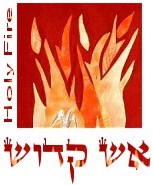
03.23.17 (Adar 25, 5777) Although it was mentioned earlier in a general way, the Torah mentions the importance of the Sabbath as a "prequel" to the construction of the Mishkan (Tabernacle) itself (i.e., Exod. 35:1-35), which teaches us that the divine rest must precede the divine service. Indeed, early Jewish tradition defined "work" as one of the 39 categories of activity (i.e., אבות מלאכה) implied in the construction the Mishkan (Bavli: Shabbat 70a). The Torah's commandment implies that the rest of the Sabbath, which testifies to God's creative activity and his role as our Redeemer (see Exod. 20:11; Deut. 5:15), is fundamental, and regarded as even more important than the construction of the Sanctuary itself. The reason for this, I believe, is that the Mishkan was meant to symbolically honor and celebrate the Divine Presence, though the awareness of God as our Source of life and healing must be observed first. The Mishkan represented service of God through human creativity, but the deepest truth of Sabbath is the exact opposite, namely, surrendering our lives to God in complete dependence, and trusting the Divine Presence to rest upon us. Sabbath, so understood in terms of surrender, trust, and letting go of our "religion" and its rituals, is therefore primary. We do not "kindle fire" on the Sabbath, which is to say, we abandon our reliance on human technique and receive the light of God's Presence instead. "There remains therefore a Sabbath (σαββατισμός) for the people of God" (Heb. 4:9).
 |
Meta-Themes of Exodus...

[ The following is related to this week's Torah reading, parashat Pekudei... ]
03.22.17 (Adar 24, 5777) The theme of the Book of Exodus essentially turns on two great events, namely, the deliverance of the Israelites from their bondage in Egypt (yetzi'at Mitzraim) and the subsequent revelation given at Sinai (mattan Torah). Both of these events, however, are grounded in the deeper theme of God's faithful love combined with the need for blood atonement. With regard to the former, the blood of the Passover lamb was required to cause death to "pass over" the houses of the Israelites; with regard to the latter, the sacrificial system (i.e., the Mishkan) was required to draw near to God.
Jewish tradition tends to regard the giving of the law at Sinai to be the goal of the entire redemptive process, a sort of "return from exile" to the full stature of God's chosen people. Some of the sages have taken this a step further by saying that God created the very universe so that Israel would accept the Torah. Such traditions, it should be understood, derive more from rabbinical thinking codified after the destruction of the Second Temple than from the narrative presented in the written Torah itself, since is clear that the climax of the revelation at Sinai was to impart the pattern or vision of the Altar to Moses. In other words, the goal of revelation was not primarily to impart a set of moral or social laws (many of which were already expressed in various ancient cultures), but rather to accommodate the Divine Presence in the midst of the people. This is not to suggest that the various laws and decrees given to Israel were unimportant, of course, since they reflect the holy character and moral will of God, unifying the Oneness of God and his power with transcendental moral structure and reality... Nonetheless, it is without question that the Torah was revealed concurrently with the revelation of the Sanctuary itself, and the two cannot be separated apart from "special pleading" and the suppression of the revelation given in the Torah itself... The meticulous account of the Mishkan is given twice in the Torah to emphasize its importance to God. (For more on this, see "The Eight Aliyot of Moses.")
As we consider these things, however, it is important to realize that underlying the events surrounding deliverance and revelation is something even more fundamental, namely, the great theme of faith (אֱמוּנָה). This theme is our response to God's redemptive love. God's love is the question, and our response - our teshuvah - is the answer. The great command is always to "Choose life!" We must chose to turn away from the darkness to behold the Light... Jewish tradition states there were many Jews who perished in Egypt during the Plague of Darkness because they refused to believe in God's love. Likewise, the revelation at Sinai failed to transform the hearts of many Jews because they despaired of finding hope...
As glorious as the redemption and revelation was, then, there was something even more foundational that gave "inward life" to God's gracious intervention. You must first believe that God loves you and regards you as worthy of His love; you must "accept that you are accepted." It is your faith that brings you near... This is the "Cinderella Story" of Exodus.
"In every generation...." The great themes of the Exodus will mean little to you unless you identify with the journey of the people, and that implies that you reckon yourself as worth saving... You must see yourself as the recipient of divine affection and love. After all, without this as a first step, how will you make the rest of the journey? This is similar to the very First Commandment revealed at Sinai: "I AM the LORD your God, who brought you out of the land of Egypt..." Notice that the statement, "I AM the LORD your God" (אָנכִי יְהוָה אֱלהֶיךָ) is said in the second person singular, rather than in the plural. In other words, you (personally) must be willing to accept the love of the LORD into your heart, since the rest of the Torah is merely a commentary (or outworking) of this step of faith. Therefore the Book of Exodus is called Shemot (שְׁמוֹת), "names," because it sees every person as a "little world" (כל אחד עולם קטן) worthy of God's redeeming love and revelation. "For God so loved the world..." (John 3:16).
Note: For more on this subject, see "Choosing to Belong: Further thoughts on Pekudei."
 |
Endurance and Suffering...

03.21.17 (Adar 23, 5777) "Pray that you may never have to endure all that you can learn to bear." Yes, though we must also trust that God "will not let us be tested beyond what we are able to bear, but with the test will also provide the way of escape (τὴν ἔκβασιν) so that we may be able to endure it" (1 Cor. 10:13). Indeed, in light of suffering what we really need is "endurance," or what the New Testament calls hupomone (ὑπομονή), a word that means "remaining [μένω] under [ὑπο]" the Divine Presence while being tested (the English word "suffer" comes from the Latin word sufferre, from sub- (under) + ferre, to carry, and therefore denotes "bearing under" difficulty). Suffering people often do not need moral platitudes or correction from others, but rather the will to believe, the strength to stay constant, and the rise of hope that gives life to simple prayers that focus the heart upon the Lord's Presence: "God have mercy..." "Help me, O God..." "I need Thee, O Lord..." When we receive grace to faithfully suffer, we hear the Spirit whispering back to us: "Be not afraid..." "Live in me..." "Walk in the light..." "I am with you always..." "You are loved..."
Life itself weans us from life as we learn that nothing ultimately belongs to us... We must learn to make peace with our sorrows and disappointments, to let go of them and to accept that this day, despite its frailty and trouble, is a precious gift from above. "My peace I give to you" (שלי שלום אני אתן לך), said Yeshua, "not as the world gives, I give to you" (John 14:27). Not as the world gives... When we let go, when we put everything in God's hands, we acknowledge that all we have is a gift from God.
 |
The Beginning and End...

[ The following is related to this week's Torah reading, parashat Pekudei... ]
03.21.17 (Adar 23, 5777) The final portion of the Book of Exodus (i.e., Pekudei) provides details about the construction of the Tabernacle (מִשְׁכָּן) and its furnishings as well as the special clothing of the priests. At the end of the portion we read, וַיְכַל משֶׁה אֶת־הַמְּלָאכָה / "Moses finished all the work" (Exod. 40:33), a phrase that has the same gematria (numeric value) as bereshit (בְּרֵאשִׁית, "in the beginning"), the very first word of the Torah (Gen. 1:1). This suggests that the very creation of the universe was for the sake of the building a dwelling place for God, and by extension, for the sake of the sacrificial love of God to be demonstrated to all of the creation. The Talmud states, "All the world was created for the Messiah" (Sanhedrin 98b) and indeed, Yeshua is called "the Lamb slain from the foundation of the world" in the New Testament (Rev. 13:8; 1 Pet. 1:18-20; Eph. 1:4; 2 Tim. 1:9). "All things were created by Him (i.e., Yeshua), and for Him" and in Him all things consist (συνεστηκεν, lit. "stick together") (Col. 1:16-17). Indeed ff Yeshua it is written: πάντα δι᾽ αὐτοῦ ἐγένετο, καὶ χωρὶς αὐτοῦ ἐγένετο οὐδὲ ἕν. ὃ γέγονεν, "All things came to be through Him, and without Him nothing came to be that exists" (John 1:3). Creation therefore begins and ends with the redemptive love of God as manifested in the Person of Yeshua our Messiah, the great Lamb of God (שֵׂה הָאֱלהִים) and the Savior of the world (מוֹשִׁיעַ הָעוֹלָם). Yeshua embodies the Heart of Creation - the Aleph and Tav (הָאָלֶף וְהַתָּו) - the Beginning and the End (ראשׁ וָסוֹף), and is named as "the One who is, and was, and is to come" (הַהוֶה וְהָיָה וְיָבוֹא), even the LORD God Almighty (Isa. 44:6; Rev. 1:17).
Some of the sages have said that "the seal of God is truth," since the final letters of the three words that conclude the account of creation -- bara Elohim la'asot ("God created to do" [Gen. 2:3]) -- spell the Hebrew word for truth (i.e., emet: אֱמֶת):
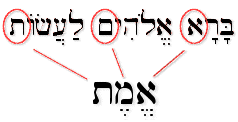 |
The idea that God created the world "to do" implies that He had finished all His work of creation (and redemption) after the sixth day (Heb. 4:3), which is another way of saying that Yeshua is the Lamb slain from the foundation of the world. "All the world was created for the Messiah." Salvation is not an afterthought or "plan B" of God's purpose for creation. "Before Abraham was, I AM." Our LORD Yeshua always is the Way, and the Truth, and the Life for us (John 14:6). As it is written of Messiah: "Worthy are you, our Lord and God, to receive glory and honor and power, for you created all things, and by your will they existed and were created" (Rev. 4:11). Blessed is the Name of the LORD forever and ever....
Count your Blessings...

[ This week we have a "double portion" of Torah: parashat Vayakhel and Pekudei. Please read the Torah portions to "find your place" here. ]
03.20.17 (Adar 22, 5777) We are commanded (i.e., "invited") to be grateful for the gift of life, to awaken to the several and small miracles that surround us, and to be conscious of everyday "signs and wonders..." The sages say that a verse from our Torah portion suggests that everyone is obliged to recite at least 100 blessings a day: "... a hundred sockets for a hundred talents of silver, one talent per socket" (Exod. 38:27). The Gerer Rebbe comments, "Just as hundred sockets served as the foundation for the sanctuary, so the daily blessings represent the soul's foundation in holiness." In Jewish thinking, we "bless" God by offering our thanks, and thereby consciousness of life is sanctified. The Hebrew term for gratitude is hakarat tovah (הַכָּרַת טוֹבָה), a phrase that means "recognizing the good." The heart looks through the eye, and therefore how we choose to see is a spiritual decision: "If your eye is "single" (i.e., ἁπλοῦς, sincere, focused)," Yeshua said, "your whole body will be filled with light" (Matt. 6:22). When we see rightly, we behold the radiance of God shining within us, even in the midst of our mundane affairs (Isa. 6:3). A grateful heart is awake to God's Presence in the little things of life, those small miracles and glories that constantly surround us. The good eye of faith sees hundreds of reasons to bless God for the precious gift of life. The LORD is "enthroned among the blessings of His people" (Psalm 22:3).
Note: If you want to see blessing, then you must open your eyes. The "commandment" here is more of a mitzvah, that is, an opportunity to become alive and awake. The idea is that you "get to" see the miracle, not that "you must" see it. It is a choice to believe (Col. 3:15).
The sages teach that in the case of doubt, however, one should not make a blessing that invokes God's Name, since doing so violates the commandment not to lift up the Name of the LORD for vain reasons (ironically, those who make an "idol" out of the Name of God are lifting up the name in vain). It is preferable not to pray than to do so insincerely or without heart (better still is to change the prayer to "Lord I believe; help Thou my unbelief"). On the other hand, surely God does not want his children to violate His will, and therefore a prayer offered be'emunah shelemah, with complete faith, will be heard in heaven. As it is written in the New Testament: "And this is the confidence (i.e., παρρησία, freedom to speak honestly) that we have with him, that if we ask anything according to his will he heeds us. And if we know that he heeds us in whatever we ask, we know that we presently have the requests that we have asked of him" (1 John 5:14-15).
 |
Accounting for the Lamb...

[ The following is related to this week's Torah reading, parashat Vayakhel-Pekudei and to "Shabbat HaChodesh," or the Sabbath that immediately precedes the Biblical New Year... ]
03.20.17 (Adar 22, 5777) In our Torah portion for this week (i.e., Vayakhel-Pekudei) we learn that Moses consecrated the Mishkan (Tabernacle) on Rosh Chodashim, "the first day of the first month of the second year [since the Exodus]" (Exod. 40:17). Note that this date (i.e., Nisan 1) marks the start of the Biblical year and the month of the Passover redemption (see Exod. 12:1-12). The Torah's calendar therefore begins with the advent of the Lamb of God, just as the central sacrifice of the Tabernacle was the daily sacrifice (i.e., korban tamid: קָרְבַּן תָּמִיד) of a defect-free male lamb offered with unleavened bread and wine. The LORD calls this "My offering, My bread..." (see Num. 28:1-8). In other words, the service and ministry of the Tabernacle constantly foreshadowed the coming Lamb of God who would be offered upon the altar "made without hands" to secure our eternal redemption (Heb. 9:11-12).
As mentioned before, the climax of the Torah given at Sinai was the revelation of the Tabernacle. The tablets of the law, summarizing the Ten Commandments, were stored inside the Ark of the Covenant (אֲרוֹן בְּרִית־יְהוָה), the innermost place of the Tabernacle, a sacred "three-in-one" box. As such, the ark served as a symbol of kisei ha-kavod (כִּסֵּא הַכָּבוֹד), the Throne of Glory. It stood entirely apart as the only furnishing placed in the Holy of Holies (קדֶשׁ הַקֳּדָשִׁים). Upon the cover of the Ark (i.e., the kapporet) were fashioned two cherubim (i.e., angel-like figures) that faced one another (Exod. 25:17-18). According to the Talmud (Succah 5b), each cherub had the face of a child - one boy and one girl - and their wings spread heavenward as their eyes gazed upon the cover (Exod. 25:20). God's voice would be heard only in the midst of innocence, humility, purity, and hope... Each year during Yom Kippur, sacrificial blood was sprinkled seven times over the cover of the Ark to symbolize the covering of the law's demand and the atonement of sin secured through Messiah.
Personal Note: I have all picked up a really bothersome cold, and I've been dealing with a very sore throat, nasal congestion, watery eyes, and so on. Your prayers are appreciated!
 |
Overcoming the Darkness...

[ "For our struggle is against spiritual forces of evil..." Eph. 6:12 ]
03.20.17 (Adar 22, 5777) Human life is a battleground of forces, and each person is engaged in a spiritual war for the healing of their soul... Often we are not willing to enter the battle until we have been sufficiently wounded by own own sins: many of us have to become "sick of being sick" until we are ready to seriously engage the underlying issues.
The battle is not optional. We must learn to deal with our own inner struggle against evil. Before we can help others to be free, however, we must be free ourselves, and that means learning how to expel the darkness hidden within our own hearts and to walk in God's light. Deliverance means being set free from that which "possesses" us, and that includes the demonic strongholds of fear, anger, envy, lust, and so on. Overmastering impulses can lead the soul to dark thoughts, self-alienation, shame -- a tenuous existence of subjugation and pain. The way of deliverance is to "name the demon," that is, to challenge the ground it claims and to exercise divine authority over our hearts. Above all this means being honest about our struggle and taking a decisive stand against our own oppression... Fighting the "good fight of faith" means caring enough to be healed...
We can only face the demonic if we are willing to be honest with ourselves, for without genuine honesty we cannot see our condition. "A little leaven leavens the whole lump" (Gal. 5:9). We must be willing to confess that there is much within us that remains unhealed, and that we are often unmindful of what really motivates our behavior. Even those things we might suppose as good - our religion or our self-control, for example - can possess us in ways that bring harm to ourselves and others....
When Yeshua expelled the demonic, the afflicted soul was given inner peace and put into their "right mind" (Mark 5:15). In other words, deliverance from madness is linked to God's healing influence in our lives: "For God has not given us a spirit of fear, but of power, and of love, and of a sound (safe) mind" (2 Tim. 1:7). Note that the word translated "safe" comes from the verb sodzo (σῴζω), meaning to be healed from inner fragmentation. A delivered person has "inner balance" and is not easily overthrown by his conscious (or unconscious) passions. Such a person is grounded in reality: he knows who he is, what he needs, and is realistic about what he can and can't do. His soul is not divided but rather unified, centered, and focused. He is consciously present and accepts life without resistance.
Yeshua gives us "authority" over the demonic to heal (Luke 9:1). The Greek word authority, eksousia (ἐξουσία), is a compound formed from the preposition ek- (ἐκ), meaning "out of," and the noun ousia (ουσία), meaning "being" or substance, thereby suggesting power over physical and spiritual reality. Another way to understand the word, however, is to see it as the ability to see beyond the realm of the transient abide within the realm of the Eternal. The Father represents the unseen, the infinite, the supreme providential and transcendental aspects of the One true God, just as the Son represents the seen, the finite, the suffering and immanent aspects of God... They are One (similarly the Holy Spirit is the Spirit of God, and therefore is One with God). Yeshua was entirely submitted to the will of the Father, which means he was able to let go and trust in the all-encompassing Divine Presence. His life was grounded in his relationship with the Eternal: "He that has seen me has seen the Father" (John 14:9). Since Yeshua lived in complete unity or "oneness" with God, he was completely centered and fully conscious of his identity as God's Son. His authority came from being preoperly aligned or related to God the Father, that is, ultimate reality, which enabled him to be a vessel or conduit for the expression of God in the world.
The Scriptures state: "Yield yourselves to God; take a stand against the devil and he will flee from you" (James 4:7). We first ground ourselves in what is real - surrendering and accepting the given moment - and then we decisively refuse to be taken captive by our imagination, fear, lust, etc. When we turn to the light the darkness will be expelled (John 1:5). Let's choose life and therefore live (Deut. 30:19); let's take our stand against the powers of hell; let's repudiate our fears and "spiritually slay" whatever seeks to drive and control us. May our hearts grow quiet before the Divine Presence and abide in peace...
 |
Shabbat HaChodesh - שַׁבַּת הַחדֶשׁ
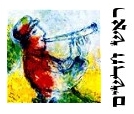
[ This coming Sabbath is called "Shabbat HaChodesh" (the "Sabbath of the Month" [of Nisan]), which marks the last Sabbath before the Biblical New Year... Shanah Tovah Chaverim! ]
03.19.17 (Adar 21, 5777) The world runs on a "clock" that operates under assumptions that are different than those revealed in the Scriptures.... The "wisdom of this world" (σοφία τοῦ κόσμου τούτου) is the prevailing cultural spirit that suppresses the reality of God's Presence and truth. Such "wisdom" is regarded as foolishness before God, and God has promised to "seize the so-called wise in their own craftiness" (1 Cor. 3:19). The life of faith, on the other hand, sees what is invisible. Faith (emunah) apprehends "the substance (ὑπόστασις) of things hoped for, the assurance (ἔλεγχος, conviction, "correction," "argument," i.e., tokhachat: תוֹכַחַת) of things not seen" (Heb 11:1). The heart of faith "looks not to the things that are seen but to the things that are unseen. For the things that are seen are transient, but the things that are unseen are eternal" (2 Cor. 4:18).
The Sabbath that immediately precedes (and sometimes falls on) the Biblical New Year is called Shabbat HaChodesh (שַׁבַּת הַחדֶש), the "Sabbath of the Month" (of Nisan). This Sabbath is significant because it marks the start of the month of Redemption (i.e., the first month called Nisan) which God called "the beginning of months" (i.e., Rosh Chodashim). We honor this event by reading an additional passage from the Torah concerning the sanctification of the new moon (Exod. 12:1-20), and we spiritually prepare for this month by studying about Passover and the coming spring holidays:

The commandment to sanctify the first new moon of the year (i.e., Rosh Chodashim) reveals that it is our responsibility to sanctify (i.e., observe) Biblical time in general. In other words, when we observe "the beginning of months," we are acknowledging that time itself is rooted in the Biblical calendar with its divinely inspired cycle of festivals (i.e., the moedim). Note that this year the Biblical New Year begins on Monday, March 27th at sundown, and therefore Passover begins exactly two week weeks later, Monday, April 10th at sundown:
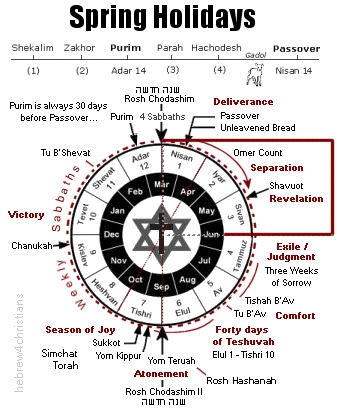 |
Originally Rosh Chodashim was simply called the "first month" because it marked the month of the Exodus and the other months were named in relation to it, similar to the days of the week in the Hebrew calendar (i.e., the first day, the second day...). Later it was called Chodesh Ha-Aviv (חדֶשׁ הָאָבִיב) - "the springtime month" (because the calendar is reset in the spring) and later still as Nisan (נִיסָן), to recall God's faithfulness after the Babylonian Exile (Neh. 2:1; Esther 3:7). So important is this month that the Jewish sage Rabbi Moshe ben Nachman (Ramban) wrote regarding the commandment to observe Rosh Chodashim:
"The verses (Exod. 12:1-2) mean that this month should be counted first, and beginning with it, the count should proceed to the second, the third, and so on, till the end of the sequence with the twelfth month. In this way, this month should be a commemoration of the Great Miracle (i.e., our Redemption), and every time we mention the months, the Miracle will be alluded to. It is for that reason that the months do not have names in the Torah, but rather they are identified by number."
The word Nisan might come from either the word nitzan (נִצָּן), meaning "bud" (Song 2:12), or the word nissim (נִסִּים) meaning "miracles," both of which suggest physical and spiritual resurrection in our lives. Others think the word comes from the verb nus (נוּס), meaning "to flee," both in relation to Israel's flight from Egypt and Egypt's flight from Israel (i.e., when the pursuing Egyptian cavalry fled (נָסִים) before the sea closed upon them (Exod. 14:25, 27). We also see this usage in the verse: "The wicked flee (נָסוּ) when no one pursues, but the righteous are bold as a lion" (Prov. 28:1). The devil's power is found in the lie. If he can make you afraid, you will not think clearly. Establishing your faith in the truth will embolden you to deal with the lies and distortions that are intended to enslave you in fear. As Yeshua said, the truth will set you free (John 8:32).
Vayakhel-Pekudei (ויקהל־פקודי)

[ This week we have a "double portion" of Torah: parashat Vayakhel and Pekudei... ]
03.19.17 (Adar 21, 5777) This week we have a "double portion" of Torah: parashat Vayakhel-Pekudei (ויקהל־פקודי). Much of this material is repeated from the earlier description of the Tabernacle (מִשְׁכָּן) to underscore the importance of the sacrificial system (the altar) and to portend the two advents of Messiah Yeshua. Note that God commanded Moses to assemble the Tabernacle on "the first month in the second year [from the date of the Exodus], on the first day of the month" (i.e., Nisan 1, or Rosh Chodashim, see Exod. 40:17). The new moon of Nisan, then, marks the beginning of month of redemption, both regarding the Exodus from Egypt (and the establishment of the altar at the Tabernacle), as well as the greater Exodus given through the altar of Messiah as spiritually foretold by this...
Note that once the Mishkan ("Tabernacle") was completed and all its components were accounted for and inspected, Moses assembled it and anointed all its components with the sacred anointing oil, called shemen ha-mishchah (note that the word "mishchah" (מִשְׁחָה) comes from the same root as "Messiah" (מָשִׁיחַ), indicating that the Mishkan would foreshadow God's plan of redemption given in Yeshua). Moses then formally initiated Aaron and his four sons into the priesthood, marking their hands and feet with sacrificial blood and "waving them" before the Lord to picture resurrection. The Divine Presence - manifest as the Shekhinah Cloud of Glory – then filled the Holy of Holies in the Tent of Meeting.
The Book of Exodus ends: "And Moses was not able to enter the Tent of Meeting because the cloud settled on it, and the Glory of the LORD (כְּבוֹד יְהוָה) filled the Mishkan (הַמִּשְׁכָּן). Throughout all their journeys, whenever the Cloud was taken up from over the Mishkan, the people of Israel would set out. But if the Cloud was not taken up, then they did not set out till the day that it was taken up. For the Cloud of the LORD (עֲנַן יְהוָה) was on the Mishkan by day, and Fire was in it by night, in the sight of all the house of Israel throughout all their journeys" (Exod. 30:35-38).
The Presence of the Glory of God that descended from Sinai upon the newly dedicated Mishkan represented a climactic moment for the fledgling nation, since the Sin of the Golden Calf had jeopardized whether the God would indeed dwell within the midst of the camp of Israel... Recall that it was only after Moses had returned from Sinai bearing the second set of Tablets (on Yom Kippur) that the glow of the LORD's redeeming love radiated from his face, and new hope was given to Israel (prefiguring the New Covenant). The King of Glory would accompany the people from Sinai to the Promised Land! (The narrative continues in the Book of Numbers, beginning exactly one month after the Mishkan was assembled.)
 |
Water into Wine...

[ This Shabbat is called "Shabbat Parah," the Sabbath of the [red] Cow." In addition to reading the regular Torah reading (i.e., Ki Tisa), we read about the mysterious red heifer sacrifice.... ]
03.17.17 (Adar 19, 5777) The first "sign" (σημεῖον) of the Messiah, namely, the miracle of turning water into wine during the wedding at Cana (John 2:1-11), prefigured his teaching about the new covenant and the wedding celebration to come. Yeshua transformed holy water intended for individual purification (i.e., mei niddah [מֵי נִדָּה], the waters that cleanse from contact with death), into a means of celebrating the gift of shared life. Instead of focusing on matters of personal holiness that might separate us, Yeshua brought love and union to the forefront. Morover, during his last Passover Seder with his disciples, Yeshua took the Third Cup, the Cup of Redemption, and sanctified it as the Cup of Betrothal, symbolizing his promise that one day we shall be united to him forever (Rev. 19:7).
It is noteworthy that Yeshua's earthly ministry began amidst betrothal and the celebration of love, and one of his central parables focused on whether people would accept the Father's invitation to join in the wedding celebration for his Son (Matt. 22:2-14). And in the world to come, we will forever celebrate the glory of God's eternal love for us...
Shabbat shalom and thank you for standing with Hebrew for Christians, friends.
 |
Mitzvah Chadashah - מִצְוָה חֲדָשָׁה

03.17.17 (Adar 19, 5777) "A new commandment I give to you, that you love one another (ἀγαπᾶτε ἀλλήλους): just as I have loved you, you also are to love one another" (John 13:34). What's new about this mitzvah is assuredly not the duty to love God and one's neighbor, since Yeshua had already affirmed the Shema and directly linked the love of God with our duty to care for others (see Matt. 22:37-39). No, what's new here is Yeshua Himself - his sacrificial grace, his unconditional acceptance, his "reckless" mercy, his everlasting atonement, and the abounding favor of God we find exclusively in him. The Torah of Yeshua is the absolute reverence of human life itself, where each soul is understood as being of infinite significance before the very Throne of God Himself.
This also explains why God even commands us to love our enemies (Luke 6:27-36). We love our enemies not because we hope they will eventually change (i.e., not by pretending they are not really our enemies), nor by contriving a mode of sentimentality, but solely because love is an ongoing decision to bestow dignity and respect to all people...
 |
The Relevance of Sabbath...
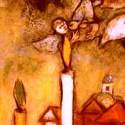
03.17.17 (Adar 19, 5777) Recall that after the people heard the Voice of the LORD speak at Mount Sinai, they drew back in fear and begged Moses to be their mediator before God. The LORD then called out to Moses, "Come up to me on the mountain and wait there, that I may give you the tablets of stone, with the law and the commandment, which I have written for their instruction" (Exod. 24:12). The "tablets of stone" (לֻחת הָאֶבֶן) referred to the sapphire blocks engraved with the Ten Commandments, of course, whereas (as explained before) the "law and the commandment" (וְהַתּוֹרָה וְהַמִּצְוָה) referred to the detailed instructions for creating the Tabernacle and establishing the sacrificial system of the Torah. In this week's Torah portion (Ki Tisa), just after God finished explaining the final details of the Mishkan and named Betzalel as its chief architect, He turned his attention back to the Ten Commandments. Before He actually handed the physical tablets to Moses, however, the LORD elaborated on the importance of observing the Sabbath day, saying:
"Above all you shall keep (שָׁמַר) my Sabbaths, for this is a sign (אוֹת) between me and you throughout your generations, that you may know that I, the LORD, sanctify you. You shall keep the Sabbath, because it is holy for you (כִּי קדֶשׁ הִוא לָכֶם). Everyone who profanes it (חָלַל) shall be put to death (מָוֶת). Whoever does any work (מְלָאכָה) on it, that soul shall be cut off (כָּרַת) from among his people. Six days shall work be done, but the seventh day is a Sabbath of solemn rest (שַׁבַּת שַׁבָּתוֹן), holy to the LORD. Whoever does any work (מְלָאכָה) on the Sabbath day shall be put to death. Therefore the people of Israel shall keep the Sabbath, observing the Sabbath throughout their generations, as a covenant forever (בְּרִית עוֹלָם). It is a sign forever (אוֹת לְעוֹלָם) between me and the people of Israel that in six days the LORD made heaven and earth, and on the seventh day he rested and was refreshed." (Exod. 31:12-17)
Before commenting on the passage above, I'd like to point out how remarkable it is that God would repeat and elaborate upon the Fourth Commandment just before He was about to hand the tablets to Moses (see Exod. 31:18). After all, God could have reviewed each of the Ten Commandments with Moses at this time; or, in light of the subsequent narrative concerning the dreadful sin of the Golden Calf (Exod. 32:1-29), God could have repeated the warning against idolatry. So why did the LORD stress the importance of observing the Sabbath at this critical moment?
As this passage makes clear, the Sabbath was intended to commemorate and honor God as our personal Creator, King, and Judge (Gen. 1:31-2:2). It is a "sign" that God has set us apart as His own treasured people. In Moses' restatement of the Torah given later, we are further commanded to remember the Sabbath day in light of God's redemption: "Remember that you were slaves in Egypt and that the Lord your God brought you out of there with a mighty hand and an outstretched arm. Therefore the Lord your God has commanded you to observe the Sabbath day" (Deut. 5:15). In other words, the Sabbath is a weekly reminder that the LORD is both our Creator and our Redeemer....
In light of this, each Shabbat we recite kiddush and remember that God is both our Creator (Gen. 1:31-2:3; Exod. 20:8, 31:7) and our great Redeemer (Deut. 5:15). As it says in our Torah portion for this week (Ki Tisa), "Above all you shall keep my Sabbaths, for this is a sign (אוֹת) between me and you throughout your generations, that you may know that I, the LORD, sanctify you. You shall keep the Sabbath, because it is sacred for you, as a covenant forever (בְּרִית עוֹלָם)..." (see Exod. 31:12-17). When we usher in Shabbat on Friday evening, we bear witness that God is our Creator, our Redeemer, and our Savior. Note that the Hebrew word for "sign" (אוֹת) is formed using a Vav (וֹ) surrounded by an Aleph (א) and a Tav (ת), a word that pictures being surrounded by God's Presence. We enter into the all-encompassing rest that God provides - relying on His power and grace alone to make us whole. "It is finished," and the Sabbath testifies of the rest we have in Messiah, our Creator and Redeemer. We let go and are renewed by the grace of God.
We are not legalistic about Sabbath observance, of course, since that surely misses the point. As Yeshua taught us: "The Sabbath was made for man, not man for the Sabbath" (Mark 2:27). Note that well. The Sabbath was made -- it is the result of God's work performed on our behalf: "Come unto me, all ye that labour and are heavy laden, and I will give you rest" (Matt. 11:28). There remains a "Sabbath rest" for the people of God, which is the principle of God's power effecting life within us. The Sabbath is a delight – not a burden; a time for celebrating the finished work of Yeshua (Isa. 58:13; Heb. 4:9).
A careful study of the Scriptures reveals that the Sabbath will be honored in the Millennial Kingdom to come, and indeed, in heaven itself. Speaking of the coming Kingdom of God that will be established upon the earth, the prophet Isaiah foretold: "From new moon to new moon, from Sabbath to Sabbath (שַׁבָּת בְּשַׁבַּתּוֹ), all flesh shall come to worship before me, declares the LORD" (Isa. 66:23). Since this vision concerns the prophetic future, it is clear that the Sabbath day (as well as Rosh Chodesh, the new moon) will be observed. Likewise, in the heavenly Jerusalem to come, the Tree of Life is said to yield "twelve kinds of fruit, yielding its fruit each month" (Rev. 22:2). Notice that the "twelve fruits" (καρποὺς δώδεκα) from the Tree of Life are directly linked to the "twelve months" of the Jewish year (κατὰ μῆνα ἕκαστον ἀποδιδοῦν τὸν καρπὸν αὐτοῦ: "each month rendering its fruit"). In other words, the sequence of the Biblical holidays (i.e., the mo'edim) - including the Sabbath - were always intended to teach us great revelation about God.
Note: I regard the various paradoxes of Scripture to constitute a test of the will to surrender be'khol levavkha, with all of your being, to God and His care... That's part of the "logic" behind the decrees of God that we don't understand: We learn to "deal with it" and embrace the tension with other, apparently contrary, truths of faith. This keeps us humble and dependent upon God for all that we genuinely understand. Shalom friends. For more on this see: "The Sign of the Sabbath: Further Thoughts on Ki Tisa."
 |
The "Passion" of Moses

[ The following is related to this week's Torah reading, parashat Ki Tisa... ]
03.17.17 (Adar 19, 5777) In the solitude of his tent Moses was deeply troubled, even distraught. Undoubtedly he pondered everything in his life that had brought him to this difficult place... Alas, in light of the recent disaster at Sinai, Moses realized he was now at an utter impasse. Would God continue His redemptive plan or was this the end of the great dream? Therefore Moses poignantly appealed to God: "If I have found favor (grace) in your eyes, let me know your ways, that I may know you and continue in your favor" (Exod. 33:13). God responded by reassuring Moses that His Presence would be with him (alone) and that he (alone) would "enter His rest." But Moses protested: "Unless You go in the lead, do not make us leave this place. For how shall it be known that I have found favor in your sight -- I and your people? Is it not in your going with us, so that we are distinct, I and your people, from every other people on the face of the earth?" And the LORD said to Moses, "This very thing that you have spoken I will do, for you have found favor in my sight, and I know you by name" (Exod. 33:15-17). Moses' successful intercession touched God's heart, causing Him to change from a mode of strict judgment (middat ha-din) to one of mercy and forgiveness (middat ha-rachamim). This was the "gospel" moment at Sinai....
Upon hearing God's words of comfort, Moses was so overcome that he exclaimed: "Oh, let me behold Your Presence!" (Exod. 33:18), whereupon God answered, "I will make all My goodness pass before you, and I will proclaim before you the name LORD (יהוה), and I will be gracious to whom I will be gracious, and will show mercy on whom I will show mercy" (Exod. 33:19, cp. Rom. 9:15). Note that Moses would receive the revelation of the Name when he "stands upon the Rock" (Exod. 33:21).
The LORD then instructed Moses to carve a new set of tablets and to meet him again at the place (i.e., makom: מָקוֹם) on the top of Sinai, where He would descend in the cloud to "declare His Name" (Exod. 33:17-34:7). This dramatic experience of revelation was later called middot ha-rachamim, or the revelation of the attributes of God's mercy, and was considered a divine addendum to the original covenant terms. Rabbinic tradition later incorporated the recitation of middot ha-rachamim during Yom Kippur.
What are some of these attributes? Notice first that the LORD calls himself rachum v'chanun (רַחוּם וְחַנּוּן), often translated "merciful and gracious." The noun rechem (רֶחֶם) means "womb" in Hebrew, indicating that God's compassion is like a mother's deep love for her child. The word chanun (חַנּוּן) comes from the word for grace or favor (i.e., chen: חֵן), and indicates that God is a graceful giver who is favorably disposed to help those in need. God is compassionate and favorable to those who call upon Him.
The curious phrase erekh apayim (אֶרֶךְ אַפַּיִם) literally means "long of nose," an idiom used to describe someone who is patient and slow to anger, i.e., "longsuffering" (Prov. 14:29). The word chesed (חֶסֶד), is often translated as "lovingkindess" or "steadfast love," and implies devotion and fidelity. God describes Himself as rav chesed v'emet (רַב־חֶסֶד וֶאֱמֶת), that is abundant in His kindness and faithful love.
It is fascinating to see that this revelation prefigures the New Covenant that was given to Israel. Just as the first set of tablets, based as they were on the justice and holiness of God, were broken, so a second set was given based on the middot (attributes) of the LORD's mercy and grace. Indeed, Yeshua was broken on behalf of the law but was raised again so that all who trust in Him can truly understand that God is "merciful and gracious, slow to anger and abounding in stedfast love and truth" (Exod. 34:6, Psalm 86:15, 103:8).
It can be argued that the revelation of the Name YHVH (יהוה) was a "gospel" moment for Israel. The episode of the Golden Calf revealed that the Jews were unable to keep the law, even though they personally experienced the power of God's deliverance from Egypt and His ongoing care on the way to Sinai. Despite the judgments brought upon Egypt, despite the overthrow of Pharaoh and his armies in the sea, despite the bitter waters made sweet, despite the manna from heaven, despite the miraculous well of Miriam, despite the awesome revelation at Sinai, and despite the pledge of the Israelites: kol asher diber Adonai na'aseh v'nishma, "All that the LORD has spoken we will do, and we will be obedient" (Exod. 19:8; 24:7), the Sin of the Golden Calf revealed that something more was needed, and that the law itself was insufficient to change the inner heart of man (Rom. 3:20). The intercession of Moses on behalf of Israel - his willingness to die on behalf of the people - revealed the heart of the New Covenant (בְּרִית חֲדָשָׁה) of the LORD, the deeper revelation of the God's character of mercy and grace. Apart from God's gracious love and compassion, the law by itself rendered only the righteous sentence of death for Israel...
For more, see "God's Stubborn Love: Further thoughts on Parashat Ki Tisa."
 |
Torah of Eternal Life (תורת חַיֵּי עוֹלָם)

03.16.17 (Adar 18, 5777) As our Teacher, Yeshua reveals the heart of God to us, teaching us about the meaning of life and death and why we suffer... Most radically, however, he offers us the cure for the sickness of "spiritual death" (i.e., separation from God) by offering the gift of his life for us. Yeshua heals us from alienation and separation from the Eternal by means of spiritual regeneration (Eph. 2:1,5; John 3:3-7). Your relationship with Messiah constitutes eternal life (חַיֵּי עוֹלָם), for it is He who "makes you alive together with him" (i.e., συζωοποιέω, the Greek word here means you are brought into a new realm of existence by participating in the life in Messiah). He offers us daily deliverance from the power of sin by means of the Spirit of Truth (רוּחַ הָאֱמֶת), though we must remain receptive to the message of hope and be transformed by the renewing our minds (Rom. 12:2; Eph. 4:23; Col. 3:10). We must be careful not to "drift away" from the truth, since that forfeits the integrity of our lives and leads us into darkness and despair: "For what benefit is it for a person to gain the whole world, yet forfeit his life?" (Mark 8:36). Faith is the means or agency of connection with what is real, though we can lose that connection by hardening our hearts and returning to our former illusions (Heb. 3:13). Exile from God is therefore self-imposed; the gates of teshuvah (repentance) are always open to those who seek God's compassion; everyone is welcome to find life in the blessing of Messiah (Luke 14:16-23; Luke 15:11-32). Therefore, draw near to God and God will draw near to you. "Let us then with confidence draw near to the throne of grace, that we may receive mercy and find grace to help in time of need" (Heb. 4:16).
 |
Beauty for Ashes...

[ The following entry concerns this week's maftir Torah reading concerning the Red Heifer... ]
03.16.17 (Adar 18, 5777) The ashes of the red heifer represented the death and sacrifice of something extremely rare, valuable, and precious. The ashes were mixed with "living water" (מַיִם חַיִּים) to reveal the truth that though the end of all flesh is but dust and ashes, the Spirit gives cleansing and life. Indeed the word ashes (אֵפֶר) may be rearranged to spell both cure (רַפֵא) and beauty (פְאֵר). The author of the book of Hebrews argues from the lesser to the greater: If the sprinkling of water mixed with the ashes of a red heifer purify the flesh from contamination with physical death, how much more does the blood of Messiah purify the soul from the deeds that cause spiritual death? (Heb. 9:13-14). Indeed, because of Yeshua's sacrifice we are given "beauty for ashes, the oil of joy for mourning, the garment of praise for the spirit of heaviness," that we may be called oaks of righteousness, the planting of the LORD, that He may be glorified (Isa. 61:3).
 |
The Purging Process...
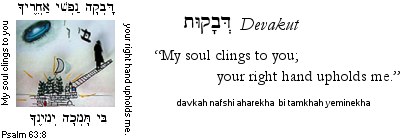
03.16.17 (Adar 18, 5777) "I am the true vine, and my Father is the vinedresser. Every branch in me that does not bear fruit he takes away, and every branch that does bear fruit He purges (καθαίρει), that it may bear more fruit" (John 15:1-2). If you bear fruit you will experience the "purging process," and that means enduring affliction... Yeshua taught, "Blessed are the pure in heart, for they shall see God" (Matt. 5:8). The Greek word translated "pure" is katharos (καθαρός), sometimes used describe the cleansing of a wound (catharsis), or to describe the unalloyed quality of a substance revealed through refining fire. We "rejoice" in testing because that is the way of real growth, sustained hope, and the revelation of God's deep love (Rom. 5:3-4). In our afflictions we are given heavenly consolation that helps us to persevere (2 Cor. 1:3-5). We are being weaned from this present age to be made ready for heavenly glory, for things unimaginably wonderful, soon to be revealed to you. Chazak – stay strong in the Lord, friends.
טוֹב־לִי כִי־עֻנֵּיתִי לְמַעַן אֶלְמַד חֻקֶּיך
tov'-lee · khee- oo·nei'·tee · le·ma'·an · el·mahd · choo·ke'·kha

"It is good for me that I was afflicted,
that I might learn your decrees." (Psalm 119:71)

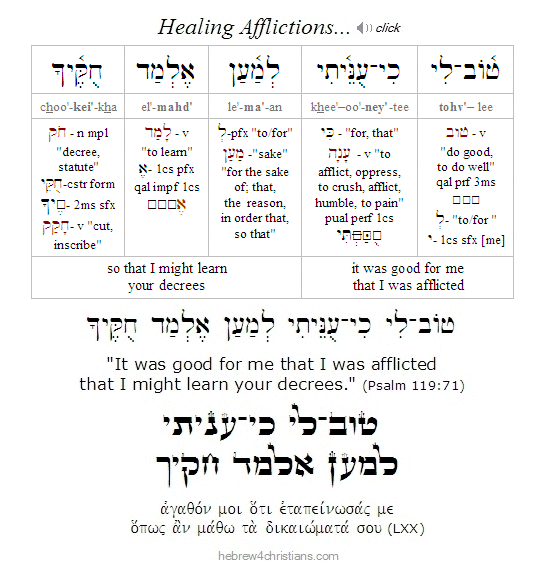
God wants us to be in a personal relationship with Him, and therefore He often sends temporal affliction to remind us of our eternal need.... After all, is there anything worse than to be "forgotten" by God? Can there be any worse punishment in this life than to be untouched by need, suffering and testing? Indeed, it is curse to be devoid of need before the LORD, and affliction is a blessing in disguise. It is a "severe mercy." As A.W Tozer once wrote, "It is doubtful whether God can bless a man greatly until He's hurt him deeply."
Just as God humbled Israel with manna in the desert, so He humbles us. "Give us this day our daily bread and deliver us..." The purpose of affliction is ultimately good and healing: God humbles us with manna, the "bread of affliction, so "that he might make you know that man does not live by bread alone, but man lives by every word that comes from the mouth of the LORD" (Deut. 8:3). In other words, God uses the discipline of affliction to lead us to the truth. We often pray that our problems be taken away, but God sometimes ordains these very problems so that we will draw near to Him... Yeshua told us, "Your heavenly Father knows what you need before you ask Him" (Matt. 6:8).
 |
Light in the Darkness...

03.15.17 (Adar 17, 5777) Surely our great need is to have heart, to find strength, resolution, and steadfast determination to walk boldly during these heartless and depraved days (2 Tim. 3:1-5). We are not without God's help, of course. Yeshua told us that the Ruach HaKodesh (רוּחַ הַקּדֶשׁ) would be "called alongside" (παράκλητος) to comfort us on the journey. The English verb "comfort" literally means "to give strength" (from com- ["with"] and fortis ["strong"]), an idea similarly expressed by the verb "encourage," that is, to "put heart [i.e., 'core'] within the soul." In Hebrew, the word courage is expressed by the phrase ometz lev (אמֶץ לֵב), meaning "strong of heart," denoting an inner quality of the will rather than of the intellect. Ometz lev means having an inner resolve, a passion, and a direction. The sages say "the mind is the eye, whereas the heart is the feet." May God be our Light and Salvation as we walk through the surrounding darkness...
יְהוָה אוֹרִי וְיִשְׁעִי מִמִּי אִירָא
יְהוָה מָעוֹז־חַיַּי מִמִּי אֶפְחָד
Adonai · o·ri · ve·yish·i, · mi'mi · i·ra?
Adonai · ma'oz · chay·ai, · mi'mi · ef·chad?

"The LORD is my light and my salvation; whom shall I fear?
The LORD is the stronghold of my life; of whom shall I be afraid?"
(Psalm 27:1)

Download Study Card
Menachem Mendl once wrote that there are three things fitting for us to do: upright kneeling, motionless dancing, and silent screaming... Not everyone will understand the pain that moves us to seek inner healing, but Gods' Presence shines for us all...
Can God Change His Mind?

03.15.17 (Adar 17, 5777) In Parashat Ki Tisa we read that God was so angry regarding the sin of the Golden Calf that He threatened to destroy the fledgling Jewish nation -- and even said that He wanted to make Moses into a new sort of "Abraham" (Exod. 32:10). Moses was appalled at the prospect and appealed to God's reputation in this matter. Would not God's Name be profaned among the Egyptians if the LORD destroyed bnei Yisrael (the children of Israel) after leading them out of bondage? Moreover, what about the covenant promises God solemnly made to Abraham, Isaac, and Jacob (i.e., brit avot)? How could the LORD break His word to the patriarchs of Israel? Because of Moses' quick intercession, God's anger was stayed and an "opening" or opportunity was given for teshuvah (repentance). Moses' intercession caused God to "repent" (i.e., nacham: נָחַם), or to change His intent regarding executing judgment upon the people of Israel for the sin of the Golden Calf (Exod. 32:14).
The idea that God can "repent" seems to contradict other verses in Scripture that express God's "immutability" or changelessness. For example, the Torah says, "God is not a man, that He should lie, nor a son of man, that He should repent" (Num. 23:19). The prophet Malachi likewise attests, "I am the Lord, I change not" (Mal. 3:6).
Some linguists suggest that the root idea of the Hebrew word nacham (נָחַם) pictures God "taking a deep breath" (or even sighing) as way of expressing regret or feeling compassion in response to an offense by others... Indeed, the word for "breath" in Hebrew is ruach, and the breath of God is part of His Voice and Life... Others regard emotional expressions ascribed to God as a form of "anthropopathism," or the assigning of human feelings and emotions to God. The rationalist idea that dibra Torah k'lashon bnei adam, "the Torah speaks in the language of men," means that the authors of Scripture wrote in human language, in terms of human understanding, and we should therefore not expect to discover truths known only to God within its pages. This is not unlike the use of metaphor and poetry in Scripture. When the Psalmist says that God is a Rock (Psalm 18:46), or that we can find refuge under the "feathers of His wings" (Psalm 91:4), we should not think that God literally is made out of a "divine mineral" or has a wingspan...
When the Scriptures say, "I am the LORD, I change not" (Mal. 3:6), the verb translated "change" is shaniti (שָׁנִיתִי), which comes from the verb shanah (שָׁנָה) meaning "to repeat, to do again." Indeed, the Hebrew word for "year" is shanah, referring to the cycle of the moedim or seasons (Gen. 1:14). The idea seems to be that God does not change like the fixed order of creation (i.e., the stars, the seasons, etc.), and by implication, that God is not subject to the "life cycle" of the natural order, with birth, life, and death. God "changes not" in the sense that He is not subject to the vicissitudes of physical creation, even though His relationship to creation is living and dynamic rather than passive or static.
Traditional Christian theology tends to regard God in Greek, rather than Hebrew, terms. Indeed, the word "theology" itself is Greek (not Hebrew) and refers to the "study of God" (θεός + λόγος), implying that God is an "object" that could be looked at, "analyzed," and known as a "thing" or divine "substance." To the ancient Greeks, the idea of God is disclosed through a process of intellectual abstraction -- through "negative theology" (i.e., denying predicates of human language to the divine), and so on. Ultimately this led to the Greek ideal of God as an "Unmoved Mover," an Immutable Divine Mind, and so on. Insofar as the early church embraced pagan Greek assumptions and thinking, its attempt at understanding God followed course, and even the study of the Scriptures became a kind of linguistic archaeology, where specimens (i.e., "texts") were looked at, a taxonomy was created, and the entire system was displayed as a museum for the mind...
How different is the picture of God we see during Moses' personal intercession on behalf of Israel, when he spoke "face to face" (i.e., panim el panim: פָּנִים אֶל־פָּנִים) with the LORD from the midst of the cloud. Here we see God "breathing deeply," that is, expressing regret or feeling compassion in response to the actions of His sinful people... God is not some static object but rather a dynamic and forceful Person. Unlike the Greek philosophers who tended to regard God as little more than a "machine" (deus ex machina) or device that caused the universe to "get going," the LORD God of Israel is intensely personal, feeling, emotional, compassionate, angry, and so on. The Hebrew view of God is that of a Living Person, a Speaking Word, and a Fiery Breath broods that over the events of the physical world.
The idea that God can "repent," then, is connected with His intimate interaction with His creation, and in particular, with His people. Still, it is an interesting question as to whether it was possible for God to have gone through with His threat and destroyed the Jewish nation, making of Moses a new sort of "Abraham." What about Jacob's prophecy that the Messiah would come from Judah (Gen. 49:10)? Indeed, how are we to understand the various "counterfactual" statements we read in the Scriptures? For example, when Yeshua decried the hardness of heart of the people of Capernaum, He said: "For if the mighty works done in you had been done in Sodom, it would have remained until this day" (Matt. 11:23). For this to have been a true statement (and of course it was, being spoken by the Savior), then it would have to correspond to something possible, a state of affairs that "could have been." In other words, had Yeshua gone to Sodom and done His great works, the people there would have repented and the city would not have been destroyed...
Classical Christian theology is draws much of its inspiration from the pagan philosopher Plato who taught that "truth" was a static property that pertains to propositions. This conception inevitably led to metaphysical speculations about "essences" and "universals" as something "more real" than the everyday world of particular cats, trees, and water lilies. Appearance and reality are two different things, and only by means of abstraction (from the particular to the universal) can the truth about ultimate reality be known. Hence we see various Christian theologians, unwittingly steeped in Greek thinking, arguing about ousia, "substance," and formalizing their conception of the Godhead as "three Hypostases in one Ousia." Even later theology that followed Aristotle more than Moses (e.g., Thomas Aquinas, Maimonides, etc.) got caught up in this sort of sophistry...
The Hebraic conception of truth, while not denying the importance of intellectual correspondence, seems to have a different focus. The Hebrew mind seemed less preoccupied with static and unchanging essences than with the (dynamic) formation of the character of the person (resulting in a sense of obligation to "restore" the world). Especially in relation to the LORD, to Whom the Jew must give account, the idea of truth became grounded in moments of moral decision encountered in one's life. Shall I steal? Shall I turn a blind eye to social injustice? etc.
For more on this topic, see: "Can God Change His Mind? Further thoughts on Ki Tisa."
 |
Theology and Art...
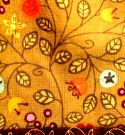
[ The following is related to our Torah reading this week, parashat Ki Tisa... ]
03.15.17 (Adar 17, 5777) Our Torah reading for this week includes the tragic account of the "Golden Calf," a molten image of gold that was forged into the shape of a calf, which was created by Aaron to pacify the people who feared they were abandoned by the LORD in the desert (see Exod. 32). The creation of the Golden Calf (i.e., egel ha'zahav: עגל הזהב) was a direct violation of the Second Commandment not to have any other gods before the LORD: not to make an idol or "carved image" (פֶסֶל) of "any likeness" (תְּמוּנָה) of anything in heaven above, or in the earth beneath, or in the water under the earth" (see Exod. 20:3-6). The Torah's language here seems to forbid making any concrete expression of the Divine Presence, a general prohibition against "finitizing" the infinite or identifying God with any aspect of creation. In other words, while God sustains and upholds all things, He is not fully present in any particular thing we experience: He is beyond all the "predications" of finite reality, and therefore we know him through a process of negation, that is, by denying that the LORD can be categorized, identified, rationalized, explained, and so on. This is part of the meaning of the Name YHVH (יהוה) after all: the ineffable, unutterable mystery and wonder of the "in-finite" Divine Presence (Gen. 32:29; Exod. 3:14; Judges 13:18; Isa. 9:6).
The problem arises, however, when we try to reconcile this abstract conception of God as "not [anything] finite" (i.e., ein sof [אֵין סוֹף], the Endless One) with the particulars of our daily experience as human beings. Indeed, how can we adequately express worship for God apart from concrete rituals and language that are bound up with finite references? We seek to represent God's beauty and truth through words, art, music, theater, and so on, yet our expressions are bound to particular things, and we are therefore unsure how our worship connects to ultimate reality... This is a problem inherent in the Torah itself, since the artistry required of the Mishkan (Tabernacle) involved devising and creating various pieces of art, and even creating molten images (e.g., the cherubim upon the kapporet of the Ark), yet this surely did not violate the deeper meaning and end of Torah! The same made be said of the rituals of the priests which foreshadowed a deeper reality -- the deeper atonement of God, the "Substance and not the shadow" (Heb. 8:5). So how do we make art that does not idolize or idealize the finite? How can we do our rituals, speak theology, preach, teach, create visual art or music, that does not distract or mislead the truth of God?
Note: Thinking about God's "transcendence" can make Him seem "far far away" to our everyday lives and struggles, though it is equally true that God is "immanent" within creation, that is, God is very near to us (and indeed he is as close as our breath and the beat of our hearts). We must exercise judicial balance here, since Scripture teaches that God is both transcendent and immanent; he is both the exalted Creator of all things (אֱלהִים) and he is the Compassionate Lover of our souls (יְהוָה). In other words, we should be careful not think of God as transcendent at the expense of his immanence (i.e., God as distant, an inaccessible "unmoved mover" etc.), and likewise we should be careful not to regard God as immanent at the expense of his transcendence (i.e., God is (quite literally) everything, i.e., "pantheism," "monism," etc). We affirm that God's Presence extends far beyond the cosmos yet intimately upholds the lilies of the field and knows the hairs on our heads... Paradoxically, He is a God who is near and a God who is far off (Jer. 23:23).
For more on this topic, see: "Theology and Art: Further thoughts on Ki Tisa."
 |
Treasures in Heaven...
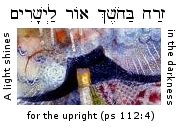
[ The following is related to this week's Torah reading, parashat Ki Tisa... ]
03.15.17 (Adar 17, 5777) Our Torah portion this week (i.e., parashat Ki Tisa) begins with the statement, "each person shall give (וְנָתְנוּ) a ransom (i.e., kopher: כּפֶר) for his life to the LORD" (Exod. 30:12). The sages note that the word ve'natnu ("shall give") can be written backward and forward, alluding to the idea that whoever gives tzedekah (i.e., "charity") never feels the loss of giving anything away. Even more: giving benevolence produces wealth; tzedakah is truly an investment in your spiritual future! Indeed it is written: "tzedakah saves from death" - צְדָקָה תַּצִּיל מִמָּוֶת (Prov. 10:2). As Yeshua said, "Give, and it will be given to you. Good measure, pressed down, shaken together, running over, will be put into your heart. For with the measure you use it will be measured back to you" (Luke 6:38). He also admonished us, "Do not lay up for yourselves treasures on earth, where moth and rust destroy and where thieves break in and steal, but lay up for yourselves treasures in heaven, where neither moth nor rust destroys and where thieves do not break in and steal. For where your treasure is, there your heart will be also" (Matt. 6:19-21).
The love of God is like that: when we give it away, it becomes our own possession. Love is inherently something shared. The converse is also true. If we withhold from others, then eventually God will make it so that we are unable to give what we would have given had we the opportunity (Matt. 13:12). "For what does it profit a man to gain the whole world and forfeit his soul?" (Mark 8:36). In this age of prevalent economic fear, giving tzedakah is truly counter-cultural and faith-affirming: but the truth abides: when we give, we receive....
"Philosophy is perfectly right in saying that life must be understood backward. But then one forgets the other clause - that it must be lived forward. The more one thinks through this clause, the more one concludes that life in temporality never becomes properly understandable, simply because never at any time does one get perfect repose to take the stance - backward" (Kierkegaard). Amen. We live one day at a time, and how we choose to live today will determine our future (Heb. 3:13). With this goal in mind, strive toward the prize of the upward call of God in Yeshua the Messiah (Phil. 3:14).
 |
Trusting His Heart...

[ The following is related to our Torah reading this week, parashat Ki Tisa... ]
03.14.17 (Adar 16, 5777) If you can't detect God's hand in your circumstances, then trust His heart... Gam zu l'tovah (גַּם זוּ לְטוֹבָה): "This too is for the good." Whenever I am confused about life (which is often), I try to remember what God said to Moses after the tragic sin of the Golden Calf: "I will make all my goodness pass before you and will proclaim before you my Name, 'The LORD' (יהוה). And I will be gracious to whom I will be gracious, and will show mercy on whom I will show mercy" (Exod. 33:19). God's character does not change: the LORD is the same "yesterday, today, and forever." The meaning of the Name, however, cannot be known apart from understanding the heart's need:
יְהוָה יְהוָה אֵל רַחוּם וְחַנּוּן
אֶרֶךְ אַפַּיִם וְרַב־חֶסֶד וֶאֱמֶת
Adonai Adonai El Ra·chum ve·chan·nun
e·rekh ap·pa·yim ve·rav che·sed ve·e·met

"The LORD, the LORD, a God merciful and gracious,
slow to anger, and abounding in steadfast love and faithfulness."
(Exod. 34:6)

Download Study Card
When Moses was first commissioned by God to lead the people out of Egypt, he had asked what God's name was so he might validate his message before the people (Exod. 3:13). The LORD thenrevealed to Moses that the name YHVH (יהוה) means: "He is Present" (i.e., the word is a play on the Hebrew verb hayah [הָיָה], "to be"), and therefore God is "always there" (Exod. 3:14). The great I AM (אֶהְיֶה) means God stands outside of the constraints of time, "one day is as a thousand years" and "a thousand years as one day" before Him (2 Pet. 3:8). Just as a thousand years is but "a watch in the night" (Psalm 90:4), so one day is as a thousand years. God's Spirit broods over all things and sustains the entire universe. God is "necessary being," the Source of Life, and foundation for all other existence. God's creative love and power sustain all things in creation...
Now while the idea that God is the Source of all life in the universe is surely important, it is not entirely comforting, especially in light of man's guilt and anxiety over death. After all, we do not stand before the "god of the philosophers," but rather the personal God of Abraham, Isaac, and Jacob. The meaning of the Name YHVH - that He is merciful, gracious, slow to anger, abounding in love and truth, and so on - therefore presents additional revelation in face of man's inherent brokenness and spiritual need (Exod. 34-6-7). This is the Name of God revealed in compassion and forgiveness -- the "New Covenant" name of God, since the meaning of YHVH was fully given in Shelosh Esrei Middot of God's mercy.... Some things in life are only known in the passion of faith... things like love, beauty, honor, and so on. The Name of the LORD as the Compassionate One is only known in humility, when all human pretense is stripped away and the inner life is laid bare in its desperate need. The Name YHVH is God's response to the heart's cry for deliverance, for compassion, for mercy....
What is God like - what is His heart - is the first question, and how we answer that will determine how we deal with all the other questions that come up in theology... What do you feel inside when you stare up at the ceiling before you go to bed? In light of the ambiguity and heartaches of life we might wonder if God is there for us. Does God care? Is He angry at me? Does He really love me? This is the raw place of faith, where we live in the midst of our questions. The Name YHVH (יהוה) means "He is present," even when we are unconscious of His Presence in the hour of our greatest need; and the Name YHVH (יהוה) also means "God is Love," the Breath of life and the essence of all our hope...
For more on this topic, see "Trusting God's Heart: Further thoughts on Ki Tisa."
 |
 |
HAPPY PURIM CHAVERIM!
Builder of the House...

[ The following is related to our Torah reading this week, parashat Ki Tisa... ]
03.14.17 (Adar 16, 5777) Our Torah portion this week (Ki Tisa) states that God endowed a man named "Betzalel" (בְּצַלְאֵל) with the Spirit of God (רוּחַ אֱלהִים), and with wisdom (חָכְמָה), understanding (תְּבוּנָה), and knowledge (דַּעַת) - the same attributes used to describe God as the Creator of the Universe (Exod. 35:31; Prov. 3:19-20). Indeed, the name Betzalel (בְּצַלְאֵל) means "in the shadow of God" (from בְּ [in] + tzel [צֵל], "shadow" + El [אֵל], "God") who "foreshadowed" Messiah in that 1) he was from the kingly tribe of Judah, 2) he was a young carpenter, 3) he was unusually "filled with the Spirit of God," 4) his father's name (Uri) means "my light" (James 1:17), 4) his assistant was called Oholiav (אָהֳלִיאָב), a name that means "my Father's tent," and 5) it was Betzalel (rather than Moses) who actually built the Mishkan, which was the pattern for the spiritual House of God (Heb. 3:3-6; 1 Pet. 2:5). Indeed, as the one who fashioned the "Ark of the covenant" where the blood would be presented for our atonement, Betzalel foresaw the message of the redemption of Messiah.
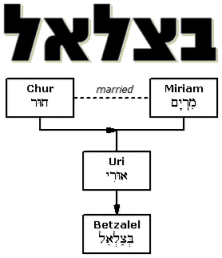 |
Note: For more on this topic, see the "Betzalel and the Messiah" article.
The Gospel at Sinai...

[ The following is related to this week's Torah reading, parashat Ki Tisa... ]
03.13.17 (Adar 15, 5777) The tragic episode of the Golden Calf revealed that the Israelites were unable to keep the law, even though they had personally experienced the power of God's deliverance from Egypt and had heard God's Voice directly speaking the Ten Commandments at Mount Sinai. The presence of the idol demonstrated that something more was needed, and that the law by itself was insufficient to change the heart (Rom. 3:20). The poignant intercession of Moses on behalf of Israel - his willingness to die on behalf of the people - foreshadowed the need for a New Covenant (בְּרִית חֲדָשָׁה), a deeper revelation of the righteousness of God in terms of mercy and grace (Exod. 34:6-7; John 1:17; Rom. 3:21). The (second) revelation of the Name YHVH (יהוה) therefore represented a "gospel" moment for Israel. Just as the first set of tablets, based as they were on the justice and holiness of God, were broken, so a second set was graciously restored based on God's forgiveness and love. Likewise, Yeshua was broken on behalf of the law but was raised again so that all who trust in Him can understand that God is "merciful and gracious, slow to anger and abounding in steadfast love and truth" (Exod. 34:6, Psalm 86:15, 103:8). Only at the cross of Yeshua are God's justice and love forever reconciled (Prov. 16:6; Psalm 85:10; Rom. 3:26).
For more on this subject, see the Ki Tisa article, "God's Stubborn Love."
 |
Torah of Brokenness...
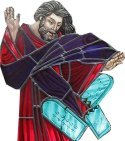
[ The following is related to our Torah reading this week, parashat Ki Tisa... ]
03.13.17 (Adar 15, 5777) It was only after Moses experienced brokenness and confession (prefigured by the shattering of the first set of tablets and the 40 days of teshuvah) that the inner meaning of God's Name was revealed as "mercy, grace, longsuffering, faithfulness, compassion," and so on (Exod. 34:6-7). The passion of Moses prefigures the inner breaking necessary before the law of God can be "written upon the heart." As it is written of the New Covenant, "I will put my law within them, and I will write it on their hearts" (Jer. 31:33).
הָרפֵא לִשְׁבוּרֵי לֵב
וּמְחַבֵּשׁ לְעַצְּבוֹתָם
ha-ro·fei · lish·vu·rei ·lev
u'me·cha·besh · le'atz·tze·vo·tam

"He is the healer of the brokenhearted
and the One who binds up their sorrows."
(Psalm 147:3)

Download Study Card
Personal Update: Please keep me in your prayers, friends... The kids have been sick and now I am fighting off a fever and congestion as well. My eyes, in particular, are really irritated and it is difficult to read. Thank you for praying.
Sabbath of the "Red Cow"
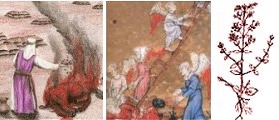
[ This Shabbat is called "Shabbat Parah," the Sabbath of the [red] Cow." In addition to reading the regular Torah reading (i.e., Ki Tisa), we read about the mysterious red heifer sacrifice.... ]
03.12.17 (Adar 14, 5777) The Shabbat that immediately follows the holiday of Purim is called Shabbat Parah (שבת פרה) - the "Sabbath of the [red] Cow," when we read in the Torah about the special sacrifice of the "Red Heifer" (Num. 19:1-22). The early sages decided to recite the laws of the Red Heifer at this time to recall the remedy of the sin of the Golden Calf mentioned in our Torah portion this week (i.e., parashat Ki Tisa), and to remind the people to purify themselves before coming to Jerusalem for the great pilgrimage festival of Passover. It is thought that since the sprinkling of the "waters of separation" cleanses from the uncleanness of death, the reading this portion would help prepare our hearts for the time of Passover when we celebrate deliverance from death.
The Red Heifer offering is considered a paradox to most Jewish thinkers, though it can be seen as a revelation of the Yeshua our Messiah. The paradox is that the one who offers this sacrifice becomes ritually impure, while the sprinkling of the ashes is used to make people clean... The ritual is considered chok within the Jewish tradition, meaning that it makes no rational sense. The Talmud states that of all the 613 commandments given in the Torah, even King Solomon with all his wisdom could not fathom this decee. However, the sacrifice of Yeshua the Messiah can be understood as the fulfillment of the symbolism of the parah adumah. Both were entirely rare and without defect (sin); both were sacrificed "outside the camp"; both made the one who offered the sacrifice unclean but made the one who was sprinkled by it clean; and finally, both sacrifices cleanse people for priestly service.
The parah adumah (i.e., Red Heifer) had to be a perfect specimen that was completely red, "without blemish, in which there is no defect (mum)." The rabbis interpreted "without blemish" as referring to the color, that is, without having so much as a single white or black hair. This is the only sacrifice in the Torah where the color of the animal is explicitly required. Moreover, the parah adumah was never to have had a yoke upon it, meaning that it must never have been used for any profane purposes.

Unlike all other sacrifices offered at the altar, the parah adumah was taken outside the camp and there slaughtered before the priest, who then took some of its blood and sprinkled it seven times before the Mishkan (thereby designating it as a purification offering). [During the Second Temple period, the High Priest performed this ceremony facing the Temple while atop the Mount of Olives.] Then the red heifer would be burned in its entirety: its hide, flesh, blood, and even dung were to be burned (unlike other Levitical korbanot). Unlike other offerings, all the blood of the sacrifice was to be burned in the fire.
Hyssop, scarlet yarn, and a cedar stick would then be thrown upon the burning parah adumah (these same items were used to cleanse from tzara'at, skin disease). In other words, the blood was assimilated into the ashes of the sacrifice, which were then gathered and mixed with water to create the "water of separation" (mei niddah) for the Israelite community. Note that the word "separation" (niddah) refers to menstrual impurity and harkens to Zech. 13:1: "On that day there shall be a fountain opened for the house of David and the inhabitants of Jerusalem, to cleanse them from sin and from niddah."
Anyone (or anything) that came into contact with a corpse (the ultimate embodiment of sin and death) was required to be purified using the mei niddah. The purification procedure took seven days, using stalks of hyssop dipped into the water and shaken over the ritually defiled person on the third day and then again on the seventh day. After the second sprinkling, the person undergoing the purification process would be immersed in a mikvah and then be unclean until the following evening.
According to Jewish tradition, the Red Heifer sacrifice was to atone for the sin of the Golden Calf, though the Torah itself does not make this association. The LORD Yeshua, our High Priest of the New Covenant, is the perfect fulfillment of the Parah Adumah, since he was completely without sin or defect (2 Cor 5:21; John 8:46); he was sacrificed outside the camp (Heb 13:13); he made himself sin for us (2 Cor 5:21); his sprinkling makes us clean (1 Pet 1:2; Heb 12:24; Rev 1:5); and the "water of separation" that his sacrifice created is the means by which we are made clean from the impurity of sin (Eph 5:25-6; Heb 10:22).
For more on the Red Heifer sacrifice, see the "Gospel of the Red Cow" article.
 |
Parashat Ki Tisa - כי תשא

03.12.17 (Adar 14, 5777) Our Torah reading for this week is Ki Tisa, one of the longest of the entire Torah. It includes the tragic account of the Sin of the Golden Calf (עֵגֶל מַסֵּכָה) and Moses' passionate intercession for Israel. After a period of teshuvah (repentance) for Israel's idolatry, the LORD graciously revealed the meaning of the Name YHVH (יהוה), that is, the thirty-two words that have become known in Jewish tradition as the Shelosh Esrei Middot, or the "Thirteen Attributes of God's Mercy." This was the LORD's own definition of His character and attributes to Moses after the breaking of the Sinai covenant. See the Ki Tisa Summary for the Hebrew text and audio of this vital revelation from God.
זָרַח בַּחשֶׁךְ אוֹר לַיְשָׁרִים
חַנּוּן וְרַחוּם וְצַדִּיק
za·rach · ba·cho·shekh · ohr · lai·sha·rim
chan·nun · ve·ra·chum · ve·tzad·dik

"Light dawns in the darkness for the upright;
He is gracious, merciful, and righteous."
(Psalm 112:4)
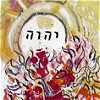
Download Study Card
Recall that in our last two Torah readings (i.e., Terumah / Tetzaveh), we read how Moses was upon Mount Sinai receiving the vision of the Sanctuary (i.e., the Mishkan or "Tabernacle") and its various furnishings. In this week's portion, God commanded that all Israelite men over the age of twenty were required to pay a tax for the upkeep of the Sanctuary: "each shall give (וְנָתְנוּ) a ransom (i.e., kofer: כּפֶר) for his life to the LORD" (Exod. 30:12). The sages note that the word ve'natnu can be written backward and forward, alluding to the idea that whoever gives tzedekah (i.e., "charity") never feels the loss of having given anything away (Bava Batra). Giving benevolence produces wealth; tzedakah is an investment in your spiritual future! Indeed, "charity saves from death" - tzedakah hatzil mi-mavet: / צְדָקָה תַּצִּיל מִמָּוֶת (Prov. 10:2; 11:4). The love of God is like that: when we give it away, it becomes our own possession. The converse is also true. If we withhold helping others, eventually we may be unable to give what we would have given had we the opportunity (and consequently, we lose our blessing). In this age of economic fear, giving tzedakah is truly countercultural and faith-affirming: but the truth abides: when we give, we receive....
After this tax was defined, the LORD described some additional elements that would be required for the priestly service at the Sanctuary, namely, a copper washstand, sacred anointing oil, and incense for the Golden Altar in the Holy Place. The Lord then named Betzalel, a man "filled with the Spirit of God" to be the chief architect of the Mishkan. Before the construction would begin, however, the Lord warned the people to be careful to observe the Sabbath day. Immediately following this admonition, God gave Moses the two tablets of the Ten Commandments, which were inscribed directly by the hand of God.
Before Moses returned to the camp, however, "certain people" had talked his brother Aaron into making a golden idol which they began to worship as their "god." The LORD then told Moses of their treachery and threatened to destroy all the Israelites, but Moses interceded on their behalf. As he rushed down the mountain, with the tablets in hand, he saw the people dancing about the idol and smashed the Tablets in anger. Moses then destroyed the idol and led the Levites in slaying 3,000 of the ringleaders.
The following day, Moses returned up the mountain and begged God to reaffirm the covenant. After a 40 day period of intercession, the Lord finally told Moses to carve a second set of Tablets and to meet him again at the summit of Sinai, where He would show Moses his glory and reveal to him the meaning of His Name (יהוה). When Moses encountered the LORD in a state of brokenness and forgiveness, his face began to shine with glory - a glory that foretold of the New Covenant of God's mercy and grace to come in Yeshua.
When the people saw Moses coming down the mountain with the second set of Tablets, they understood they were forgiven and that the Covenant had been renewed. When they approached him, however, they drew back in fear, because his face was radiant with the glory of God. Moses reassured them, however, and then told them all that the Lord had commanded while he was on the mountain. When Moses had finished speaking with them, he put a veil (מַסְוֶה) over his face. From that time on, Moses wore a veil in the camp, though he removed it whenever he went before the Lord for further instructions.
The Whole Megillah...
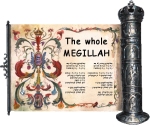
[ The holiday of Purim begins sundown this Saturday... Happy holidays friends! ]
03.10.17 (Adar 12, 5777) The Hebrew word for "scroll" is megillah (מְגִלָּה). In conversational English, however, the term "the whole Megillah" has come to mean a long, involved story told in great detail... Though this connotation might be appropriate regarding matters that are tedious to hear (such as listening to an insurance salesman's pitch), if you've ever read or heard the story of Queen Esther in Megillat Esther (the Scroll of Esther), you know that it's anything but a droning tale. No, in this fascinating megillah there's plenty of action, romance, intrigue, suspense, danger, and delicious irony. Best of all, the "whole megillah" gives us great reason to celebrate God's providential care for His people -- and that of course includes God's care for you and me, too!
Much is made over the fact that the book of Esther is the only book of the Tanakh that does not explicitly mention the Name of God. However, the idea of God's sovereignty and hashgachah (divine providence) is clearly implied throughout the entire story. In light of this nes nistar, or "hidden miracle" of the Jew's deliverance, Esther and Mordecai ordained that Purim should be observed as a "day of feasting and merrymaking" and of sending gifts to the poor (Esther 9:22,28). By the way, Purim was so named because Haman had cast lots (purim) to determine the day on which to destroy the Jews.
The phrase hester panim (הֶסְתֵר פָּנִים) means "hiding of the face" and is often used when discussing the Book of Esther. In this sense of the term, hester panim is somewhat like the sun on an overcast day: Just because you don't see it doesn't mean it isn't there. God's providential love is at work at all times, whether we perceive it or not.
The festival of Purim ("lots") is celebrated every year on the 14th of Adar -- always a month before Passover (though in Israel, Shushan Purim is observed a day later, on Adar 15). For most Jews, Purim is celebrated somewhat like Halloween and Mardi Gras combined, with masquerade parties, revelry, and sending baskets of goodies to friends (mishloach manot). Eating "hamentaschen" (the traditional holiday cookies made to resemble "Haman's ears") are also part of the fun. It is customary to attend services to hear Megillat Esther chanted (keriat ha-megillah) and to watch the children of the synagogue put on an endearing "Purim Play" (with an all-star cast of characters, including the evil Haman, the good guy Mordecai, and the heroine Esther!) If you've never seen a children's Purim play, you're missing a great simcha!
So what does Purim teach us? Well, besides celebrating the sovereignty of God in world full of "control freaks," Purim is a time to commemorate and anticipate the Kingship of the LORD God of Israel. Tyrants and all purpled princes of this age take note! Like the false usurper Haman, you are likewise doomed to failure, and the LORD will vindicate all those who trust in Him for deliverance!

Yeshua spoke of that insatiable lust within the unregenerate heart that leads to violence, oppression, and slavery of every kind:
You know that those who are considered rulers of the Gentiles lord it over them, and their great ones exercise authority over them. But it shall not be so among you. But whoever would be great among you must be your servant, and whoever would be first among you must be slave of all. For even the Son of Man came not to be served but to serve, and to give his life as a ransom for many. (Mark 10:42-45)
This might sound counterintuitive to those who have been indoctrinated into believing that a lifestyle of self-centered fulfillment, power, and carnal pleasure are the goals of life, but Yeshua turns the world's logic on its head by affirming that true greatness is not to found in the eyes of others but solely in the humble acknowledgment of our eternal indebtedness to God for everything. It is the servant, the slave, "the nonentity" who is considered great in God's kingdom. Mankind's lust for power and greatness is nothing but the ridiculous donning of a "tinfoil crown."
In anticipation of Purim, then, let me wish you and your family Purim Sameach -- with the prayer that you will stand true to your faith, despite this wicked world and its syncretizing influences... Hooray for Mordecai! -- may the LORD raise up many like him! And may Haman and his kind forever be foiled in their attempts to undermine those who call upon the Name of the LORD God of Israel. Amen.
Separated for Love...

03.10.17 (Adar 12, 5777) "For I am the LORD who brought you up out of the land of Egypt to be your God. You shall therefore be holy, for I am holy" (Lev. 11:45). Because we are God's people, his redeemed children, we should be holy, just as God is holy (1 Pet. 1:15-16). Holiness, however, is not a matter of what you do (such as wrapping yourself in religious rituals) but instead is a matter of what you "allow" to happen: You let go and allow yourself to be rescued and taken up from the "depths of Egypt" to be with God. Holiness is something you receive; it is a gift of being "set apart" to be sacred and beloved by God. Genuine holiness (i.e., kedushah) is connected with love and grace.
In Hebrew, the word kedushah (קְדוּשָׁה) means sanctity or "set-apartness" (other Hebrew words that use this root include kadosh (holy), Kiddush (sanctifying the wine), Kaddish (sanctifying the Name), kiddushin (the ring ceremony at a marriage), and so on). Kadosh connotes the sphere of the sacred that is radically separate from all that is sinful and profane. As such, it is lofty and elevated (Isa. 57:15), beyond all comparison and utterly unique (Isa. 40:25), entirely righteous (Isa. 5:16), glorious and awesome (Psalm 99:3), full of light and power (Isa. 10:7), and is chosen and favored as God's own (Ezek. 22:26).
After the LORD split the sea and led his people across, Israel sang a song of praise to Him. Shirat Hayam (the Song of the Sea) is an "antiphon", or song of response to the loving deliverance given by the LORD (Exod. 15:1-21). "The LORD is my strength and my song, and he has become my salvation; this is my God, and I will praise him, my father's God, and I will exalt him..." "Who is like you, O LORD, among the gods? Who is like you, majestic in holiness, awesome in glorious deeds, doing wonders? You have led in your steadfast love the people whom you have redeemed; you have guided them by your strength to your holy abode... You will bring them in and plant them on your own mountain, the place, O LORD, which you have made for your abode, the sanctuary, O Lord, which your hands have established."
Note further that the opening statement, "Then they sang" is actually in the future tense: "Then they will sing," which refers to the coming of Messiah. Indeed, in Revelation 15:3 we read that the song will indeed be sung to the Heavenly Bridegroom in the coming New Jerusalem... Note also that in the closing phrase of the song, "the LORD will reign forever" (Exod. 15:18), the word "will reign" (יִמְלךְ) is spelled with a missing Vav, which suggests the Messiah Yeshua. The LORD will indeed reign when the rightful heir to the throne of David and the true King of Israel soon appears. Then shall we be with our Beloved forever and ever.
 |
God of Second Chances...

[ The following is related to this week's Torah reading, parashat Tetzaveh... ]
03.10.17 (Adar 12, 5777) "Now this is what you shall do to them (i.e., Aaron and his sons) to consecrate them that they may serve me as priests" (Exod. 29:1). The question may be asked why the LORD chose Aaron and his sons for this great honor, especially since the patriarch Jacob had excluded Simon and Levi from leadership during his prophetic deathbed "blessing" delivered to his children: "Let my soul come not into their council... Cursed be their anger, for it is fierce, and their wrath, for it is cruel. I will divide them in Jacob and scatter them in Israel" (Gen. 49:6-7). The very tribe consigned to anonymity, however, was chosen and restored to become the tribe of God's priesthood in Israel, which shows that our merciful God bestows second chances for us to serve him. Likewise the Gentiles, who were once "strangers and outsiders" to the covenants and blessings of ethnic Israel, have been brought near by the blood of Messiah, being made fellow citizens with the saints and members of the household of God" (Eph. 2:12-13,19). Therefore, as the Apostle Peter attested: "You are a chosen race, a royal priesthood, a holy nation, a people or his own possession, that you may proclaim the excellencies of him who called you out of darkness into his marvelous light. Once you were not a people, but now you are God's people; once you had not received mercy, but now you have received mercy" (1 Pet. 2:9-10).
 |
The Heavenly Covering...

03.10.17 (Adar 12, 5777) The word used in the ancient Greek Torah (i.e., the Septuagint) to translate the Hebrew word kapporet (i.e., "cover" of the Ark of the Covenant) is hilasterios (ἱλαστήριος), the very same word used to describe the atonement given at the cross of the Savior in the New Testament: "God put forward Yeshua as a propitiation (ἱλαστήριον) through faith in His blood" (Rom. 3:25). In other words, the sprinkling of Yeshua's blood - represented by His Passion upon the cross - was "presented" upon the Heavenly Kapporet, that is, before the very Throne of God Himself, to make everlasting atonement for our souls. Yeshua is our great High Priest after the order of Malki-Tzedek (i.e., Melchizedek), the One who provides everlasting forgiveness for our sins (Heb. 9:7-10:10). Because of His sacrifice, the parochet - the wall-like covering separating the Holy of Holies - was rent asunder and God's love was let loose upon the world! Amen!
Parables and Purim...
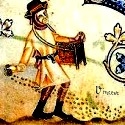
[ The following is related to the festival of Purim which begins sundown this Saturday... ]
03.10.17 (Adar 12, 5777) The Hebrew word for "parable" is mashal (מָשָׁל), which means a "likeness" or "similitude," though it also can refer to a proverb or ethical maxim (as in the case of Mishlei Shlomo, the Proverbs of Solomon). In the New Testament, the word παραβολή means juxtaposition, or the casting (βάλλω) of one thing beside (παρα) another thing for the purpose of comparison or contrast. Figuratively, a parable resembles the shape of a parabola, that is, a "u-shaped curve" that goes out and turns back in on itself. Hence the parables of Jesus generally have a "twist" that is meant to turn the hearer back to question his or her own perspective, heart attitude, and so on. The purpose of the parable is to provoke us think outside of our prejudices so that we can see divine possibility in our lives.
Undoubtedly Yeshua often taught in parables because they simultaneously conceal and reveal the truth. A parable obscures the truth to those who don't really want it; just as it reveals the truth to those who do (Luke 8:9-10). Since Yeshua's whole life was a parable of sorts - a "disguise" that led to the victory of our deliverance (Phil. 2:7) - it is not surprising that he regularly used "figures of speech" to provoke people to examine their own heart attitude and faith... In this connection note that Yeshua never explained the "mysteries of the kingdom of God" directly to the crowds, nor did He ever pander to the crowd's clamor or interests. His message is always meant for the individual soul who was willing to follow Him -- to the one who had "ears to hear."
"As you go about, let people know that the Kingdom of Heaven (מַלְכוּת הַשָׁמַיִם) has come. Take care of the sick, waken the lifeless, forgive the sinner, and banish the demonic" (Matt. 10:7-8). We proclaim the truth of the kingdom when we serve as healers, caregivers, and those who seek to bring the grace of God and inner peace to others.. "Go into all the world and preach the gospel, and sometimes use words..."
Note: For more on this topic, see the Purim article, "Parables and Revelation."
 |
Accepted and Loved...
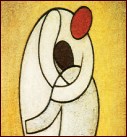
03.10.17 (Adar 12, 5777) The parable of the feast (see Luke 14:16-24) reveals how Yeshua regards "gatekeepers" of God's kingdom -- those self-appointed moralists and religious experts who accept only those whom they consider virtuous, worthy, or doctrinally kosher. Contrary to this "exclusionary" sense of personal holiness, the Lord loves people and implores them to enjoy table fellowship with him: "Go out to the highways and hedges and compel people to come in, that my house may be filled" (Luke 14:23). Indeed, the Lord himself stands at the door and knocks for you... (Rev. 3:20). The courage to "come to the table" will be found when you realize that you welcomed and accepted, regardless of the sins and troubles of your life. Hence we see how the outcasts -- the prostitutes, the tax collectors, the lepers, and the sick -- were all drawn to the Messiah. They found true acceptance in His presence and tender compassion in His eyes... When Yeshua touched the leper and laid his hands on the dead girl (Mark 5:40-41), he forfeited his own personal purity for the sake of God's love. Ultimately holiness is not a means of self-protection, but rather loving others enough to take hold of them in their state of sickness and need.
 |
The Power of God...

03.10.17 (Adar 12, 5777) People often confuse morality with religion, saying things like, "if I do good, the rest will take care of itself," but Yeshua did not come to simply teach (or reinforce) moral truth, but to die for our sins and to transform our nature. The advent of Messiah is not the "second coming of Moses" but something of a radically different order. The message of the cross is not that we should reform ourselves with renewed hope, but rather that our old nature must die and be replaced with something far greater... When King David cried out to the Lord, "Create in me a clean heart, O God," he did not use the Hebrew word yatzar (יָצַר), which means to "fashion" or "form" something from pre-existing material (Gen. 2:7), but he instead used the word bara (בָּרָא), a verb exclusively used in the Torah to refer to God's direct creation of the cosmos (Gen. 1:1). In other words, King David understood that no amount of reformation of his character would be enough, and therefore he appealed to that very power of God that alone could create yesh me'ayin (יֵשׁ מֵאַיִן), or "out of nothing." Such was the nature of the remedy required that was fulfilled in the cross of Messiah...
לֵב טָהוֹר בְּרָא־לִי אֱלהִים
וְרוּחַ נָכוֹן חַדֵּשׁ בְּקִרְבִּי
lev · ta·hor · be·ra·li · E·lo·him,
ve·ru·ach · na·khon · cha·desh · be·kir·bi

"Create for me a pure heart, O God,
and renew a right spirit within me"
(Psalm 51:10)

Hebrew Study Card
Yeshua taught, "Blessed are the pure in heart, for they shall see God" (Matt. 5:8). The Greek word translated "pure" is katharos (καθαρός), sometimes used describe the cleansing of a wound (catharsis), or to describe the unalloyed quality of a substance revealed through refining fire. Metaphorically, then, purity of heart refers to separation from the profane - singleness of vision, wholeheartedness, passion, and focused desire for the sacred. Faith is a great trembling of love: "With this ring I do worship thee..." As we center our affections on Yeshua, we become pure in heart -- i.e., unified, made whole, and healed of our inner fragmentation. We see the Lord both in this world, through his effects, and then panim el panim (פָּנִים אֶל־פָּנִים), "face to face," in the world to come. Our hope purifies us for that coming great day of full disclosure (1 John 3:2-3; Heb. 12:14).
Eternal life from God is first of all ontological - it is about your being, identity, reality, and so on. If you are "born again" you are briah chadashah (בְּרִיאָה חֲדָשָׁה) - a new creation (2 Cor. 5:17; Gal. 6:15). The realm of conscience, law, morality, imperative, etc., while valid, is not the ultimate goal of redemption. Sinai was always meant to lead to Zion, which means that salvation ultimately is about who you are as a beloved child of God more than what you do as a moral or religious person... Understand this distinction, chaverim!
 |
Wisdom of the Heart...
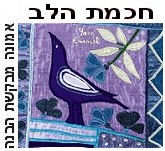
[ The following is related to this week's Torah reading, parashat Vayakhel... ]
03.10.17 (Adar 12, 5777) From our Torah portion this week we read: "Let every wise-hearted (חֲכַם־לֵב) among you come and make all that the LORD has commanded" (Exod. 35:10). The sages comment that none of the people actually had the skills to fashion the glorious things of the sanctuary, but they had something even better – a passionate desire to do God's will, and this enabled them to access God's help to do what was needed. The purpose of the commandment was to involve the heart, to refine the character: "And everyone whose heart moved him brought what was needed…" (Exod. 35:22). God could have created the sanctuary "yesh me'ayin," out of nothing, but he wanted the heart of his people to express their desire for his presence in their midst.
The beginning of wisdom is the awe of the LORD (Psalm 111:10), that is, relating to reality with reverence and learning to distinguish what is sacred. Note that God does not build the mishkan directly, but allows us to bring our heart and creativity to the task. Practically speaking being chacham-lev, "wise of heart," means knowing what you must do to help reveal divine beauty in the world.
רֵאשִׁית חָכְמָה יִרְאַת יְהוָה
שֵׂכֶל טוֹב לְכָל־עשֵׂיהֶם
תְּהִלָּתוֹ עמֶדֶת לָעַד
reishit · chokh·mah · yir·at · Adonai
se·khel · tov · le'khol · o·se·hem
te·hil·la·to · o·me·det · la'ad

"The awe of the LORD is the beginning of wisdom;
all those who practice it have a good understanding:
His praise stands forever."
(Psalm 111:10)

Seduction of Kabbalah...
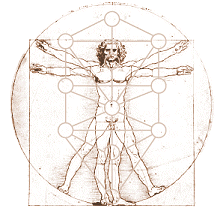
[ The following is a reminder for those who need it... ]
03.09.17 (Adar 11, 5777) The rise of pop "Kabbalah" is postmodern Judaism's attempt to have spirituality (or a personal relationship with God) apart from Yeshua... Some popular Kabbalists have charisma and a form of wisdom, especially when they consider the needs of the heart to cleave to God, but in general they more resemble "New Age" mystics than the great sages of Torah... Historically speaking, the metaphysics and theology of Kabbalah are clearly derived from Plato and 2nd century "Neoplatonism," with its cosmological "emanation theory" (i.e., sefirot) that was later "re-branded" as Jewish mystical philosophy during the Middle Ages. Practitioners of Kabbalah sometimes claim that it traces dates back to the first century, though the definitive text of Kabbalah, called the "Zohar" (זהר), was compiled in the Middle Ages by Moses De Leon (1250-1305) who claimed that it contained the mystical writings of the 2nd century sage Simeon bar Yochai (i.e., רשב"י [rashbi], from Rabbi Shimeon bar Yochai), who was the disciple of the famous false teacher Rabbi Akiva (50-135 AD) [note that Akiva was responsible for the deaths of hundreds of thousands of Jews when he claimed Simon Bar Kochba was the choden Messiah to lead a war against the Roman Empire in the 2nd century AD]. Most modern scholars consider De Leon as the original author of the Zohar, based on careful language analysis, though many kabbalists irrationally believe the Zohar to be a "third Torah" of mysticism that dates back to the time of Moses (or even to Adam in the Garden of Eden). Be careful, chaverim... True spirituality centers on God's redemption given in Yeshua, and therefore "test the spirits" to see whether they are of God (1 John 4:1).
As I've said before, Kabbalah is essentially an attempt to synthesize Hellenism (i.e., the Greek thinking of Plato and Aristotle) and Gnosticism with Judeo-Christian revelation. As such, it is a "panentheistic" (God-is-in-everything-yet-is-above-everything) system, and much of what is passed off today as Kabbalah comes from the Haskalah (השכלה) period of Jewish thought.... The Neoplatonic idea of "the One" as utterly transcendent and beyond "Being" is renamed as "Ein Sof"; the divine emanations are renamed as "sefirot"; the descent (and ascent) of the soul and the role of gnosis as a means to salvation is refashioned as various meditative techniques, and so on.
For more about the seduction of Kabbalah, click here.
 |
The "Now" Covenant...
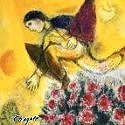
03.09.17 (Adar 11, 5777) Yeshua often taught using stories, parables, metaphors, and so on. He rarely "gave the answer" to a direct question, but instead provoked dialog, discussion, deep thinking, etc. Yeshua did this, I believe, to rebuff mere triflers but also to expose what was really going on within the heart... Good teachers understand that the indirect method is often the best for making their point, since that enables the hearer to "own" the message for themselves. Storytelling is part of the tradition of Yeshua. Applied to idea of Scripture, this means that we should be careful not to make an "idol" out of the Bible or to demand absolute certainty when there is none. Of course the Bible is God's Word and is the truth, but what matters is how we respond to the words of the Bible; after all, the Bible points to the Reality, the Living Word of Power that sustains all things right here, right now... We talk a lot about the "old" covenant and the "new" covenant, but what about the "now" covenant? The real question is the heart's motive and secret desires -- right now.
 |
Ultimate Concerns...

03.09.17 (Adar 11, 5777) Some people think "religion" is a bad word, though etymologically it simply means to "reconnect" with your ultimate concern. Understood this way, it is not so much about creeds or rituals as it is about worship, that is, whatever you regard as unconditionally worthy or sacred... And since people necessarily make judgments about what they value, every person is a "worshiper" of something or other. Shema, chaverim: The question that matters is what is your ultimate concern? What gives your life its justification or ultimate significance? What moves you to get out of bed in the morning, to go through your day, and to keep hope alive in your heart? What do you want? Where are you going? What burden are you willing to ask God to help you lift, and why?
Note: The "epistemological" problem, that is, the question of how knowledge is possible, is ultimately grounded in the will, since God has given intuitive awareness of his existence and power, yet he has also given people the ability to deny the truth and turn to idolatry, if that is what they desire (Rom. 1:19-20). You are free to choose what to believe, to be sure, though you are not free not to so choose.... As Blaise Pascal once said, "there is enough light for those who want to believe, and enough shadows to blind those who don't." Therefore we read that "the fear of the LORD is the beginning of knowledge; but fools despise wisdom and instruction (Prov. 1:7), which implies that the abandonment of God's authority leads to corruption, both intellectually and morally. The myth of the autonomous man ultimately leads to slavery and despair. Healing comes from awakening to truth, namely, the truth of God revealed in the Messiah, for this truth sets you free, both ontologically (with regard to being and reality) and existentially (with regard to the inner life).
 |
The Eternal Light...

03.09.17 (Adar 11, 5777) "You shall command the people of Israel that they bring to you pure beaten olive oil for the light, so that the light of the Menorah will ascend always" (Exod. 27:20). This refers to the "ner tamid" (נֵר תָּמִיד), a constant source of illumination used in the sacred place, though by analogy it refers to the inner light of consciousness that requires our daily attention. Just as the high priest was to kindle the lamps of the Menorah every evening and morning (Exod. 30:7-8; Lev. 24:2-3), so we must regularly kindle the divine light by opening our hearts and choosing to see with hope. Indeed we are responsible to sanctify (i.e., make special or sacred) the LORD within our hearts, as it says: "Sanctify yourselves and be holy: for I AM the LORD your God" (Lev. 20:7); and, "You shall be holy: for I the LORD your God am holy" (Lev. 19:2). We are to "let our light shine" which means apprehending the truth of God and expressing it in our lives (Isa. 60:1; Matt. 5:16). As we behold the beauty and grace of God, we become alive to the sacredness of life and its blessings (2 Cor. 4:6).
בָּרוּךְ אַתָּה יְהוָה אֱלהֶינוּ מֶלֶךְ הָעוֹלָם
פּוֹקֵחַ עִוְרִים
ba·rukh · at·tah · Adonai · e·lo·hey·nu · me·lekh · ha'o·lam
po·ke·ach · iv·rim

"Blessed are You LORD our God, King of the Universe
who opens the eyes of the blind."
Our Lord said, "Whoever has my commandments and keeps them, such is the one who loves me. And the one who loves me will be loved by my Father, and I will love him and will manifest myself to him" (John 14:21). Note that the Greek word translated "manifest" means to "shine inside" (i.e., ἐμφανίζω, from ἐν, "in" and φαίνω, "shine"), indicating that the revelation would be inward light of the Presence of Messiah himself (Χριστὸς ἐν ὑμῖν, ἡ ἐλπὶς τῆς δόξης, Col. 1:27). As we receive God's love, as we embrace it as our own, the love of Messiah will become visible to you. This comes from a place of inward surrender. As Paul Tillich said, "Sometimes in a moment of weakness light breaks into darkness, and it is as though a voice says, 'You are accepted; you are accepted... Do not seek for anything; do not perform anything; do not intend anything. Simply accept the fact that you are accepted.' If that happens to you, then you experience grace, and everything will be transformed."
 |
Meaning and the Mishkan...

03.08.17 (Adar 10, 5777) The subject of the Mishkan (i.e., "Tabernacle"), with all of the elaborate details about its furnishings, utensils, and the priestly rituals themselves, has led to theological questions about the relationship between faith and reason, or between "chukkim" (i.e., decrees that surpass human reason) and "mishpatim" (i.e., logically understandable judgments). Some sages, such as the esteemed Rashi, teach that God's decrees are meant to develop our loyalty to God. For example, if a king commands a law but his subjects refuse to obey it unless it makes rational sense to them, then it is clear that they are not loyal to the will of the king but rather to their own reason. Therefore when God issues a decree it is a matter of trust and obedience rather than a matter of rational undertanding.... Those who regard the divine decrees from this perspective do not offer any logical "meaning" behind the detailed construction of the Mishkan, but only descriptions of its various components and rituals.
On the other hand, "rational" sages such as Moses Maimonides reject the idea that chukkim are irrational or unknowable, and instead believe that they reveal divine secrets for God's own purposes. Not only are the divine decrees reasonable and purposive, they say, but each detail of the Mishkan portends divine wisdom and meaning. For example, if we consider the Menorah – its form, shape, construction, and its associate daily rituals – it seems inconceivable that it was revealed "by chance," or without any intelligible intent. Therefore each nuance of the Tabernacle reveals truth about God's great plan of redemption. For instance, during the yearly Yom Kippur avodah (service) - when the High Priest would divest himself of glory and be clothed in humble attire - the sacrificial blood was sprinkled upon the kapporet (cover/crown) of the Ark of the Covenant that contained the tablets of the law. The sacred "three-in-one" chest was located within the innermost chamber of the "three-in-one" Tabernacle -- the Holy of Holies, symbolizing the sacred Heart of God Himself – where the sacrificial blood given by God was offered to God for the purification from sin (Lev. 17:11). Regarding our understanding of the Mishkan, then, we agree with Maimonides over Rashi: Each detail – from the larger furnishings down to the utensils used by the priests – all served the greater purpose of revealing the healing love of God given in Yeshua...
 |
The Fight for Sanity...
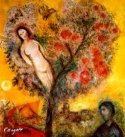
03.08.17 (Adar 10, 5777) We are surely living in stressful times, friends... The Scriptures say the time just before the prophesied "end of days" would be "perilous" (χαλεπός) and full of human depravity (2 Tim. 3:1-5). In light of the raging spiritual war all around us, the following needs to be restated: "The important thing is to not lose your mind..."
Indeed, the mind is the "gateway" to your heart, and it is therefore essential to guard your thinking by immersing yourself in the truth... Fear is often the result of believing the lie that God is not in control or is unable/unwilling to help you... "Not losing your mind" means being grounded in what is real, and it therefore means understanding your identity and provision as a child of God. "God has not given us the spirit of fear, but of power (גְּבוּרָה / δύναμις) and of love (ἀγάπη), and of a "sound mind" (σωφρονισμός), literally a "delivered" mind, "healed" from fragmentation (2 Tim. 1:7). The Greek word "sound mind" (σωφρονισμός) comes from the word saos (σάος), meaning "safe" in the sense of being under restraining influence and care of the Spirit of God... The closest Hebrew word might be musar (מוּסָר), moral "discipline." Test your thinking: God does not lead us into fearful craziness or self-destruction, but instead leads us to trust and to genuine inner peace.
Part of the task of "guarding your mind" is being able to discern between good and evil. "The fear of the LORD is to hate evil (יִרְאַת יְהוָה שְׂנאת רָע); I hate arrogant pride and the evil way and perverse utterances" (Prov. 8:13). As Amos cried out, "Hate what is wrong, love what is right" (שִׂנְאוּ־רָע וְאֶהֱבוּ טוֹב). We are called to love the truth and abhor the lie. Tolerating sin in a world ripe for judgment is a tacit form of "collaboration" with the enemy... Indeed, the only thing regarded as intolerable in the devil's world is the objection that people have a supposed "liberty" to sin. But the LORD is clear on this point: "Woe to those who call evil good and good evil; Woe to those who turn darkness into light and light into darkness, and woe to those who turn bitter into sweet and sweet into bitter. Those who think they are wise in their own sight are as good as dead, those who think they possess understanding" (Isa. 5:20-21). If you feel crazy in an insane world, then you are likely quite sane, and the world will indeed feel strange once you have been awakened from its madness and refuse to be moved by the delusions of the crowd...
Yeshua said to Pontius Pilate, "For this reason I was born, and for this reason I came into the world - to testify to the truth. Everyone who belongs to the truth listens to my voice" (John 18:38). Our Torah portion this week includes the statement, Lo ta'amod al dam re'ekha: "You must not stand idly by when your neighbor's life is at stake" (Lev. 19:16). The principle of lo ta'amod (לא תַעֲמד) means that we have a moral duty to speak the truth when others are victimized. "Standing idly by" can therefore mean refusing to come forward with the truth about a situation from fear of the consequences, but it can also mean excusing the sin of our culture and of our friends. "A truthful witness (עֵד אֱמֶת) rescues lives, but the one who breathes lies (יָפִחַ כְּזָבִים) brings deception" (Prov. 14:25). As it is written, "You shall not spread a false report. You shall not join hands with a wicked man to be a malicious witness (עֵד חָמָס)" (Exod. 23:1). It is the truth that sets people free to serve God, but this presupposes the ability to discern how we all become enslaved to deception. "You are to distinguish between the holy (i.e., ha-kadosh: הַקּדֶשׁ) and the common (i.e., ha-chol: הַחל), and between the unclean (i.e., ha-tamei: הַטָּמֵא) and the clean (i.e., ha-tahor: הַטָּהוֹר)" (Lev. 10:10, see also Ezek. 44:23). Just as God separated the light from the darkness (Gen. 1:4), so we are called to discern between (בֵּין) the realms of the holy and the profane, the sacred and the common, and the clean and the unclean. Indeed, the Torah states "God called the light Day, and the darkness he called night," thereby associating His Name with the light but not with the darkness (Gen. 1:5). "For you all are sons of the light and sons of the day. We are not of the night nor of the darkness" (1 Thess. 5:5). We are instructed therefore to wear the "armor of light" (Rom. 13:12) and to be equipped to wage spiritual warfare in God's Name (Eph. 6:11-18). The victory is ours in Yeshua, friends (1 Cor. 15:57).
 |
Lights and Perfections...
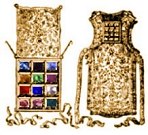
03.08.17 (Adar 10, 5777) The High Priest's breastplate contained a pouch holding two mysterious gemstones called the "Urim and Thummim" (אוּרִים וְתֻמִּים), usually translated "lights and perfections." According to the Targum Jonathan, when a matter was brought to the High Priest for settlement, he would sometimes hold these before the Menorah and the Shekhinah would refract and irradiate various letters inscribed on the stones of the breastplate to reveal the will of God. Other sages, however, have said these stones were like lots (purim) used to get "yes/no" responses from the LORD (e.g., 1 Sam. 14:41, 28:6, Ezr. 2:63; Neh. 7:65). Note that the word "urim" begins with the letter Aleph (א), the first letter of the alphabet, and the word "thummim" begins with Tav (ת), the last letter, which suggests the words of Yeshua: "I AM the Aleph and the Tav (אָנכִי אָלֶף וְתָו), the Beginning and End (רִאשׁוֹן וְאַחֲרוֹן), the First and the Last" (Rev. 22:13). Our holy Scriptures declare that in these last days God has spoken to us "by his Son, whom He appointed the Heir of all things, through whom also He created the worlds" (Heb 1:2). Note that the Greek construction for the phrase translated, "by his son" is ἐλάλησεν ἡμῖν ἐν υἱῷ, which literally means "he spoke to us in Son" -- that is, in the language or voice of the God the Son Himself... God speaks in the language "of Son" from the midst of the fire revealed at Zion.
Of course we do not discern the will of God using these methods any longer, since the veil of the Holy of Holies has been removed (Matt. 27:51), and we have access to the Throne of Grace to speak with God as if panim el-panim (פָּנִים אֶל־פָּנִים), "face to face." Referring to Yeshua as our High Priest of the New Covenant it is said: "For we do not have a high priest who is unable to sympathize with our weaknesses, but one who in every respect has been tempted as we are, yet without sin. Let us then with confidence draw near to the throne of grace, that we may receive mercy and find grace to help in time of need" (Heb 4:14-15).
"Therefore, since we have confidence to enter the holy places by the blood of Yeshua, by the new and living way that he opened for us through the curtain, that is, through his flesh, and since we have a great priest over the house of God, let us draw near with a true heart in full assurance of faith, with our hearts sprinkled clean from an evil conscience and our bodies washed with pure water. Let us hold fast the confession of our hope without wavering, for he who promised is faithful." (Heb. 10:19-23)
Intercession and Incense...
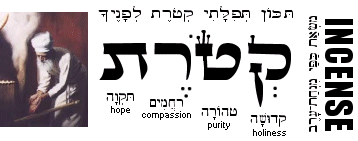
[ The following is related to this week's Torah reading, parashat Tetzaveh... ]
03.08.17 (Adar 10, 5777) The last item described in the Mishkan (i.e., the "Tabernacle") was a golden "altar of incense" (מִזְבַּח הַקְּטרֶת) that was to be placed in the Holy Place just before the veil separating the Holy of Holies. Every morning and evening the High Priest would burn sacred incense on this altar (symbolizing his prayer and intercession), and the blood of atonement was also applied there during the Yom Kippur service (Exod. 30:6-10). The sages say that the word "incense" – i.e., ketoret (קְטרֶת) – can be thought of as an acronym of the words kedushah (קְדוּשָׁה), "holiness," tahorah (טָהֳרָה), "purity," rachamim (רַחֲמִים), "compassion," and tikvah (תִקוָה), "hope," characteristics that marked the passion of Yeshua who interceded for us as he offered his blood before the heavenly kapporet as our High Priest of the new covenant. Indeed, the word ketoret comes from a root word (קטר) that means to offer sacrifice, further alluding to the intercession of Messiah on our behalf (Heb. 7:25). Disciples of Yeshua are likewise called priests of God (Rev. 1:6; 1 Pet. 2:5), and our prayers and service are regarded as a "sweet-smelling savor" offered to the Lord (Rev. 8:4). As it says in the Psalms: "Let my prayer be counted as incense before You; the lifting up of my hands as the evening sacrifice."
תִּכּוֹן תְּפִלָּתִי קְטרֶת לְפָנֶיךָ
מַשְׂאַת כַּפַּי מִנְחַת־עָרֶב
ti·kon · te·fil·la·ti · ke·to·ret · le·fa·ne·kha
ma·sat · ka·pai · min·chat · a·rev

"Let my prayer be counted as incense before You;
the lifting up of my hands as the evening sacrifice."
(Psalm 141:2)

Note: The Talmud states that the sacred incense recipe was made of eleven different spices, ten of which had pleasant fragrance, but one of which (i.e., galbanum) had an unpleasant odor. The sages explain that that the word for "community" in Hebrew (i.e., tzibbur: צִבּוּר) may be understood as an acronym for tzaddikim (צַדִּיקִים), "the righteous," be'nayim (בֵּינַיִם), "the intermediate," and resha'im (רְשָׁעִים), "the wicked," and that the presence of galbanum makes place for the transgressors... The presence of an unpleasant odor in the sacred mixture represents our laments, our cries, and confession for the foulness of our sins.
Sound of the Bells...

[ The following is related to this week's Torah reading, parashat Tetzaveh... ]
03.08.17 (Adar 10, 5777) A verse from our Torah reading this week intimates something wonderful: "And it (the robe with golden bells) shall be on Aaron when he ministers, and its sound shall be heard (v'nishma kolo) when he goes into the Holy Place (הַקּדֶשׁ) before the LORD, and when he comes out, so that he does not die" (Exod. 28:35). Note that the Hebrew phrase "so it shall be heard" (וְנִשְׁמַע קוֹלוֹ) can refer not only to the ringing of the bells but to the Voice of the LORD (קוֹל יְהוָה), as Adam and Eve experienced (Gen. 3:8). The priests served barefoot in the sanctuary, so a holy hush was regularly observed. It was God's voice that was to be heard through the bells, a soft call to hear and to return...
 |
The sound of the bells teaches us that we need quietness, especially within the heart, to properly hear God speaking "kol demamah dakkah" (קוֹל דְּמָמָה דַקָּה) - in a "still small voice," "the sound of a low whisper" (1 Kings. 19:12).
כִּי כה־אָמַר אֲדנָי יְהוִה קְדוֹשׁ יִשְׂרָאֵל
בְּשׁוּבָה וָנַחַת תִּוָּשֵׁעוּן
בְּהַשְׁקֵט וּבְבִטְחָה תִּהְיֶה גְּבוּרַתְכֶם
ki · khoh · a·mar · Adonai · Elohim · ke·dosh · Yisrael
be'shu·vah · va'na·chat · tiv·va·shei·un
be'hash·ket · u·ve·vit·chah · tihyeh · ge·vu·rat·khem

"For thus said the Lord GOD, the Holy One of Israel,
"In returning and rest you shall be saved;
in quietness and in trust shall be your strength."
(Isa. 30:15)

Why Celebrate Purim?
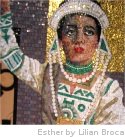
[ The holiday of Purim begins Saturday, March 11th at sundown this year... ]
03.07.17 (Adar 9, 5777) Historically-speaking, the "institutional church" has neglected the Book of Esther and consequently ignored the Biblical holiday of Purim. Perhaps this is because the central point of the book reveals God's providential care for ethnic Israel, and some Christian theologians have found this conclusion abhorrent to their theological biases... Indeed, the story of Esther leads inescapably to the celebration of Jewish identity and survival despite the evil plans and designs of anti-Semites, and therefore those theologians that believe that the church replaces Israel will tend to regard the message of the book with suspicion (or they will likely attempt to reinterpret "Israel" to mean the "church"). For those who understand that the church partakes of the covenantal blessings given to Israel, however, the Book of Esther is a beautiful story about God's faithful love and care for His people... Amen. There is a future and a hope for Israel that will indeed be fulfilled!
You do realize that the term "new covenant" (בְּרִית חֲדָשָׁה) is foretold and described in only one place in the entire Tanakh (i.e., "Old Testament")? Here is the relevant passage:
Behold, the days are coming, declares the LORD (יהוה), when I will make a new covenant with the house of Israel and the house of Judah, not like the covenant that I made with their fathers on the day when I took them by the hand to bring them out of the land of Egypt, my covenant that they broke, though I was their husband, declares the LORD. For this is the covenant I will make with the house of Israel after those days, says the LORD: I will put my Torah (תּוֹרָה) into their inmost being and inscribe it upon their hearts; I will be their God, and they will be my people. No longer will they need to teach one another and say to one another, "Heed the LORD"; for all of them, from the least of them to the greatest, shall heed Me -- declares the LORD. For I will forgive their iniquities, And remember their sins no more. (Jer. 31:31-4)
Many Christian theologians stop here and ignore the surrounding context of this passage, namely, the remarkable promise that ethnic Israel would continue to exist as a unique people as long as the laws of nature are in operation:
Thus saith the LORD (יהוה) who gives the sun for a light by day and the ordinances of the moon and of the stars for a light by night, Who stirs up the sea into roaring waves, Whose name is LORD of Hosts (יהוה צְבָאוֹת שְׁמוֹ): If these laws should ever be annulled by Me -- declares the LORD -- only then would the offspring of Israel (זֶרַע יִשְׂרָאֵל) cease to be a nation (גּוֹי) before Me for all time (כָּל־הַיָּמִים). Thus said the LORD: If the heavens above could be measured, and the foundations of the earth below could be fathomed, only then would I reject all the offspring of Israel (זֶרַע יִשְׂרָאֵל) for all that they have done -- declares the LORD. (Jer. 31:35-37)
From this passage -- again, the only in the entire "Old Testament" that explicitly mentions the New Covenant of Yeshua -- it's clear that the continuation and perpetuity of the physical descendants of Israel (zera' Yisrael) is to be reckoned as sure as the very "laws of nature" that are upholding the physical universe. In other words, so long as there is a sun shining during the day and moon and stars during the night, Israel will continue to be a nation (goy) before the LORD for all time (kol-hayamim). Using another analogy, it is as likely for someone to accurately measure the extent of the heavens and earth than it is to suppose that the LORD will cast off all of the seed of Israel. Note especially the last qualifying clause of this verse, "for all they have done," indicating that the unconditional faithfulness of the LORD is not based on the conditional behavior of national Israel.
The implications of this are staggering. Have you seen the sun, or the moon or the stars today? If so, then you can be assured that the ethnic nation of Israel retains a place in God's great plan for the ages. The gift and the calling of God is irrevocable (Rom. 11:29).
For more on this timely subject, see the "Scandal of Esther," here.
 |
Commandments and Connection...
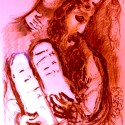
03.07.17 (Adar 9, 5777) The Hebrew word tetzaveh (תְּצַוֶּה) means "you shall command," though the sages note that the root word can also mean making a "connection" (tzavta), which implies that the commandments were given to unite our hearts with God. "If you keep my commandments, you will abide in my love, just as I have kept my Father's commandments and abide in his love... This is my commandment," said Yeshua, "that you love one another as I have loved you" (John 15:10-12). The heart of God's Torah (i.e., his will and desire) is for you to abide in Him and for you to know how he cleaves to you... The yoke of Yeshua gives rest to the soul; his yoke is easy and his burden is light (Matt. 11:29-30).
Names upon his heart...

[ The following is related to this week's Torah reading, parashat Tetzaveh... ]
03.07.17 (Adar 9, 5777) The onxy stones attached to the shoulder pieces of the High Priest's vest (i.e., ephod: אֵפד) and the twelve precious stones arrayed on his breastplate (i.e., choshen: חשֶׁן) were inscribed with the names of the tribes of Israel. "And Aaron shall bear their names before the LORD on his two shoulders for remembrance" (Exod. 28:12). "So Aaron shall bear the names of the sons of Israel in the breastpiece of judgment (i.e., choshen ha'mishpat: חשֶׁן הַמִּשְׁפָּט) upon his heart, when he goes into the Holy Place, to bring them to regular remembrance before the LORD (Exod. 28:29). The sages comment that just as a father carries his young child on his shoulders, or a shepherd his lamb, so the High Priest carried his people before the LORD in intercession. Similarly, at the cross Yeshua carried our names on his shoulders, bearing the burden of our sins as he cried out before the Father. As our great High Priest of the New Covenant, Yeshua "bore the judgment of the people upon his heart" as he made intercession for them (Isa. 53:12; Rom. 8:34).
 |
Oil of Illumination...
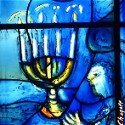
[ The following is related to this week's Torah reading, parashat Tetzaveh... ]
03.07.17 (Adar 9, 5777) Again from our Torah portion this week (i.e., Tetzaveh) we read: "You shall command the people of Israel that they bring to you pure olive oil "crushed" for the light, that an eternal lamp (נֵר תָּמִיד) may be set up to burn" (Exod. 27:20). The Hebrew word for "pure" olive oil is zakh (זָךְ), which refers to the clearest oil derived from squeezing out (or crushing) the very first drop from the choicest olive. The purest of oil was obtained by a process of "crushing for the light" (כָּתִית לַמָּאוֹר), which symbolizes the Light of the World, the One Crushed for our iniquities, the "Man of Sorrows" (אִישׁ מַכְאבוֹת) who offered himself up for our healing and illumination (Isa. 53:1-5). Some things are seen only through the process of tribulation, breaking, and surrender. When we kindle this lamp, we are able to see the truth; we perceive how God's heart was crushed for the sake of our salvation...
 |
Purim and Prophecy...
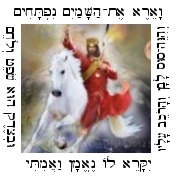
[ The following concerns the festival of Purim, which begins March 11th at sundown... ]
03.06.17 (Adar 8, 5777) Both Chanukah and Purim are holidays that celebrate God's victory over the forces of darkness... Just as the prophet Daniel foresaw the events of Chanukah, that is, the rise of "Epihpanes," the "Messiah of Evil" who will one day attempt to "assimilate" all of humanity into a "New World Order" (Dan. 9:27, 2 Thess. 2:3; Rev. 13:7-9, etc.), so Purim foretells how this wicked one will attempt to destroy the Jewish people during the End of Days (אַחֲרִית הַיָּמִים), though he will be destroyed by his own wicked devices. The Midrash Esther says that Purim, unlike many of the other holidays, will be celebrated even after the final redemption after the End of Days. This is because the story of Purim -- i.e., God's covenantal faithfulness and defense of His people -- will be magnified in the deliverance that leads to the establishment of the Messianic Kingdom upon the earth. Indeed, the Second Coming of the Messiah will be regarded as the final fulfillment of Purim! So while it is a often seen as time of unbridled celebration in Israel (ad lo yoda), the holiday of Purim has a very sober prophetic message that foretells the glorious end of this age.
Here is a vision of the coming "Purim haGadol," the great deliverance:
Then I saw heaven opened, and behold, a white horse! The one sitting on it is called Faithful and True (נֶאֱמָן וְיָשָׁר), and in righteousness he judges and makes war. His eyes are like a flame of fire, and on his head are many diadems, and he has a Name written that no one knows but himself. He is clothed in a robe dipped in blood, and the Name by which he is called is the Word of God (דְּבַר הָאֱלהִים). And the armies of heaven, arrayed in fine linen, white and pure, were following him on white horses. From His mouth comes a sharp sword with which to strike down the nations, and He will rule them with a rod of iron. And He will tread the winepress of the fierce fury of the wrath of God, the Ruler over All (παντοκράτωρ), the LORD God Almighty (יְהוָה אֱלהֵי צְבָאוֹת). On his robe and on his thigh he has a Name written, the King of kings (מֶלֶךְ הַמְּלָכִים) and the Lord of lords (אֲדנֵי הָאֲדנִים). And with the breath of his lips He will slay the wicked. - Rev. 19:11-16
May that day come speedily, and in our time...
HAPPY PURIM CHAVERIM!
The Words of Light...
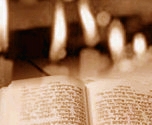
[ The following is related to this week's Torah reading, parashat Tetzaveh... ]
03.06.17 (Adar 8, 5777) Our Torah portion this week (Tetzaveh) begins with commandment to "keep the light burning" (Exod. 27:20). God's first words of creation were yehi ohr: "let there be light!" (Gen 1:3), just as the Menorah served as a picture of the radiant Tree of Life. The heart looks through the eye, and how we choose to see is ultimately a spiritual decision: "If your eye is "single" (i.e., ἁπλοῦς, sincere, focused)," Yeshua said, "your whole body will be filled with light" (Matt. 6:22). In other words, when we see rightly, we will behold the radiance of God shining within us (Isa. 6:3). We are enabled to see by means of the revelation of the Word: "The entrance of your words give light (Psalm 119:130). But we must kindle the light within our hearts; we must open our eyes its brilliance, we must choose to see the Divine Presence with "eyes of the heart" that are being enlightened (Eph. 1:8). For God, who said, "Let light shine out of darkness," has shone in our hearts to give the light of the knowledge of the glory of God in the face of Yeshua the Messiah (2 Cor. 4:6). Torah ohr (תורה אור). May our "light so shine!"
פֵּתַח דְּבָרֶיךָ יָאִיר מֵבִין פְּתָיִים
pe·tach · de·va·re·kha · ya·ir · mei·vin · pe·ta·im

"The entrance of your words give light,
giving insight to the simple."
(Psalm 119:130)

Note that the verse is often translated, "The entrance of your words give light," though it may better be rendered as "the opening up (פֵּתַח) of your words releases light." In other words, as we realize the true intent of the words - their context, usage, application, exposition, etc. - we will experience the light of revelation.
Priests of His Light...

03.06.17 (Adar 8, 5777) Our Torah for this week (Tetzaveh) describes the ceremony of consecration to the priesthood. We are chosen to be a "kingdom of priests," a set-apart people, and a light to the nations (Exod. 19:6; Isa. 42:6; 1 Pet. 2:9). Note the very first responsibility given to the priests was to care for the ner tamid (נר התמיד), the light of the Menorah (Exod. 27:20-21), which represents our consciousness of the Divine Presence (Psalm 18:28; 36:9). The challenge we all face is to remain "in the light as God is in the light" and not to be seduced by the world of fleeting appearances (Isa. 2:5; 1 John 1:7, 2:17). God's eternal light radiates through all things (Isa. 6:3; Psalm 139:11-12), just as the great "yehi ohr" (יְהִי אוֹר) - "Let there be light" - is the first word spoken to creation (Gen. 1:3). To be a priest means being so filled with the truth that you radiate peace; your inner light shines and you glorify your Father in heaven (Matt. 5:16). That is how we draw others to the truth, by receiving the beauty of the LORD (Psalm 27:4).
Of course being a "witness to the light," that is, being a "priest," does not mean you are a "perfect person" who walks about with a blissed-out attitude despite the various trials and tests we all face in this life. No, we all still sin, and we therefore need to confess the truth of our condition to abide in the light (1 John 1:9; James 5:16). Like everything else in Scripture, here we encounter paradox, as Yeshua taught: "Blessed are the impoverished in spirit (πτωχοὶ τῷ πνεύματι), for theirs is the kingdom of heaven; blessed are the ones who mourn (οἱ πενθοῦντες), for they shall be comforted; blessed are the meek (οἱ πραεῖς), for they shall inherit the earth" (Matt. 5:3-5). Yea, "God chose what is foolish in the world to shame the wise; God chose what is weak in the world to shame the strong, God chose what is low and despised in the world, even things that are not, to bring to nothing things that are, so that no human being might boast in the presence of God" (1 Cor. 1:27-29).
The Hebrew word for priest (i.e., kohen: כּהֵן) may come from the word ken (כֵּן) meaning "yes" and the word kivun (כִּווּן) meaning to "direct" or "lead," implying that a priest helps direct a person toward affirming the Reality and Truth of God. The role of a priest is to draw us to God, then, but how is that possible if the mediator cannot genuinely understand our sorrows and struggles? What draws others to God is his love, but how can we come to believe in that love were it not for the priesthood of the leper, the priesthood of the outcast, the priesthood of the reject? Even so Yeshua was afflicted with our infirmities and therefore sympathizes with our brokenness and frailty (see Heb. 4:16).
As a priest of brokenness, you are called to be a wounded healer, and you can testify of God's saving grace and love for you despite your sorrow, anger, weaknesses, and failures... Accepting God's compassion for you - just as you are - allows you to show grace and kindness to others who are also hurting, and therefore you can serve as a priest of God.
אֱלהִים יְחָנֵּנוּ וִיבָרְכֵנוּ
יָאֵר פָּנָיו אִתָּנוּ סֶלָה
E·lo·him · ye·cho·nei·nu · vi·va·re·khei·nu
ya'eir · pa·nav · it·ta·nu · se·lah

"May God be gracious to us and bless us
and make his face to shine upon us, Selah"
(Psalm 67:1)

Be encouraged, friends... "For the commandment is a lamp and Torah is light, and the reproofs of discipline are the way of life" (Prov. 6:23). Here we may understand the "reproofs of discipline" as the (ongoing) process of consciously turning away from darkness (of fear, anger, etc.) to the behold the divine light. We have to start here, after all... The way of life is teshuvah (repentance, turning to God), which is a painful process to the lower nature, but is necessary to walk in the light. Confession brings light into our hearts (James 5:16; 1 John 1:5-9), and the end of our struggle is healing and life.
Tetzaveh and Purim...

03.05.17 (Adar 7, 5777) Our Torah reading this week (Tetzaveh) begins with instructions for kindling the holy lampstand: "command the people of Israel to bring to you pure beaten olive oil for illumination (לַמָּאוֹר) to offer up (olah) a continual lamp (נֵר תָּמִיד)." Note that the word translated "lampstand" is menorah (מְנוֹרָה), from the word for lamp, ner (נֵר). What's interesting about this verse is that the commandment to "offer up a continual lamp" occurs before the Tabernacle - and the menorah - was even made. God's Light must shine first -- even before we can direct our worship to Him.... The Light of His Presence precedes even the "tent of meeting" itself.
There is a Purim connection here. Perhaps you are familiar with the "Urim and Thummim," the "lights and perfections" that the High Priest sometimes used to discern messages from the LORD? Some scholars believe these were like lots (purim) that were used to get "yes/no" responses from the LORD (e.g., 1 Sam. 14:41, 28:6, Ezr. 2:63; Neh. 7:65). When Haman the Agagite kept "rolling the dice" until he found the "propitious" time to seek the destruction of the Jews (Esther 3:7), God was indeed watching. After Haman "divined" the twelfth month (Adar), he appealed to the King to put his hateful plan into action... He slandered the Jews and sought to incite the King's anger against them as traitors who pledged allegiance to a different King... All this was foreseen by the LORD and under His sovereign control. Little did Haman know that the dice he cast was for the appointed day of his own death. And so it goes for all those who "cast the lot" without understanding the overarching sovereignty of God...
For more on this subject see the article: "Parashat Tetzaveh and Purim."
 |
Note: Earlier March 2017 updates continue here...
|
















































































